ASC General Society Awards
2025 HERBERT BLOCH AWARD
The Herbert Bloch Award (established in 1961) is given to recognize outstanding service contributions to the American Society of Criminology and to the professional interests of criminology. Nominators should send a letter evaluating the nominee’s contributions relevant to this award, and the nominee’s curriculum vitae to the Bloch Award Committee Chair in electronic format.
Members of the ASC Board may not receive this award during their term in office. The Executive Board may decide not to give the award in any given year. Award decisions will be based on the strength of the nominees’ qualifications and not on the number of nomination endorsements received for any particular candidate. All nomination materials should be submitted to the Committee Chair in electronic format. The deadline for nominations is March 1.
Committee Chair: Robert Crutchfield, University of Washington
2025 GENE CARTE STUDENT PAPER COMPETITION
The Gene Carte Student Paper Award (established in 1971) (Sponsored by Wiley Publishing Co.) is given to recognize outstanding scholarly work of students. Any student currently enrolled on a full-time basis in an academic program at either the undergraduate or graduate level is invited to participate in the Carte Student Paper competition. Those enrolled in Post-Doc programs are ineligible.
Prior Carte Award first place winners are ineligible for any future Carte student paper competitions. Previous prize-winning papers (any prize from any organization and or institution) are ineligible. Dual submissions of the same paper for the Carte Award and any other ASC award in the same year (including division awards) are disallowed. Papers can be submitted to only one ASC student competition in the same year. Students may submit only one paper a year for consideration. This includes co-authored works. Multiple authored papers are admissible for Carte Award consideration, as long as all authors are students in good standing at the time of the submission. Papers that have been accepted for publication at the time of submission for the Carte Award are ineligible.
Papers may be conceptual and/or empirical but must be directly related to criminology. Papers may be no longer than 8,000 words (excluding tables and references). The Criminology format for the organization of text, citations and references should be used. Authors’ names and departments should appear only on the title page. The next page of the manuscript should include the title and a 100-word abstract. The authors also need to submit a copy of the manuscript, as well as a letter verifying their enrollment status as full-time students, co-signed by the dean, department chair or program director, all in electronic format.
Those who submit papers for the Carte award must sign a statement that verifies that they are the authors of the said piece (ie., the piece is not plagiarized). The students’ academic advisor will also submit a signed statement that to the best of their knowledge, the paper has been authored by the said student and is not plagiarized. If the Carte Committee feels the paper was plagiarized, the Committee Chair may contact the said student’s advisor(s) and indicate that the Carte Committee feels that the paper may have been plagiarized.
The Carte Award Committee will rate entries according to criteria such as the quality of the conceptualization, significance of the topic, clarity and aptness of methods, quality of the writing, command of relevant work in the field, and contribution to criminology. The 1st, 2nd, and 3rd place papers will be awarded prizes of $1000, $600, and $400, respectively and will be eligible for presentation at the upcoming Annual Meeting. The 1st prize winner will also receive a travel award of up to $1000 to help defray costs for attending the Annual Meeting. The Executive Board may decide not to give the awards, or to give fewer than three awards, in any given year. Award decisions will be based on the quality of the manuscripts and not on the number of nomination endorsements received for any particular manuscript. All nomination materials should be submitted to the Committee Chair in electronic format. The deadline for submission is April 15.
Committee Chair: Pamela Wilcox, The Pennsylvania State University
2025 RUTH SHONLE CAVAN YOUNG SCHOLAR AWARD
The Ruth Shonle Cavan Young Scholar Award (established in 1997) is given to recognize outstanding scholarly contributions to the discipline of criminology by someone who has received a Ph.D., MD, LL.D. or a similar graduate degree no more than five (5) years before the selection for the award (for this year the degree must have been award no earlier than May 2020), unless exceptional circumstances necessitated a hiatus in their scholarly activities. Eligibility extensions for major career interruptions include but are not limited to giving birth (one year per child, up to two years total), adoption, illness as well as having care responsibilities, which cause a hiatus or significant impediment to scholarly activities. Nomination letters should concisely explain the circumstances justifying the extensions. If the candidate has multiple graduate degrees, the last five-year period is from the date when the last degree was received. The award may be for a single work or a series of contributions, and may include co-authored works. Those interested in being considered or in nominating someone for the Cavan Award should send: (a) a letter evaluating a nominee’s contributions to the discipline of criminology; (b) when relevant, include an explanation/justification for “major career interruptions;” (c) applicant’s/nominee’s curriculum vitae; and (d) no more than 3 published works, which may include a combination of articles and one book. Members of the ASC Board may not receive this award during their term in office. The Executive Board may decide not to give the award in any given year. Award decisions will be based on the strength of the nominees’ qualifications and not on the number of nomination endorsements received for any particular candidate. All nomination materials should be submitted to the Committee Chair in electronic format, except for book submissions. A hard copy of any book submission should be mailed to the Committee Chair. The deadline for nominations is March 1.
Committee Chair: Richard Leo, University of San Francisco
2025 DU BOIS AWARD
The W.E.B. Du Bois Research Award (established in 2023) is given to recognize transformative scholarship that engages criminology, criminal justice and race/ethnicity. The scholarship may be based on research that investigates in the intellectual tradition of Du Bois, such as an examination of race/ethnicity-related issues through methodology, theory development/critique, historical analysis, and/or ethnographic scholarship. The award, which may be given to an individual or collaborators, may be based on a single book, a single article, a thread of related research, or the body of work of a senior scholar.
Members of the ASC Board may not receive this award during their term in office. The Executive Board may decide not to give the award in any given year. Award decisions will be based on the strength of the nominees’ qualifications and not on the number of nomination endorsements received for any particular candidate. Nominators should send a letter evaluating the nominee’s contributions relevant to this award, and the nominee’s curriculum vitae to the Committee Chair in electronic format. The deadline for nominations is March 1.
Committee Chair: Shaun Gabbidon, The Pennsylvania State University
2025 ASC FELLOWS
The ASC Fellows Committee invites nominations for Fellows in the Society. This designation is given to recognize scholarly contributions to criminology and distinction in the discipline. Longevity alone is not sufficient. Examples of contributions may include innovations in public policy as well as enhancing diversity, equity and inclusion within the Society and the field of criminology. In addition, a Fellow must have made a significant contribution to the field through the career development of other criminologists and/or through organizational activities within the American Society of Criminology. Nominees must be members in good standing of the Society. The Board may designate up to five (5) persons as Fellows annually.
Nominators should send a letter evaluating the nominee’s contributions relevant to this award, and a copy of the nominee’s curriculum vitae to the Fellows Committee Chair in electronic format. Please limit nominations to a single cover letter and the nominee’s curriculum vitae.
Members of the ASC Board may not be designated as Fellows during their term in office. The Executive Board may decide not to designate any Fellows, or to designate fewer than five (5) Fellows, in any given year. Fellow designation is based on the strength of the nominees’ qualifications and not on the number of nomination endorsements received for any particular candidate.
All nomination materials should be submitted to the Committee Chair in electronic format. The deadline for nominations is March 1.
Committee Chair: Faye Taxman, George Mason University
2025 GRADUATE STUDENT POSTER AWARD
The Graduate Student Poster Award is given to recognize outstanding scholarly work of students. Any student currently enrolled on a full-time basis in an academic program at the graduate level is invited to participate in the Graduate Student Poster competition. Those enrolled in Post-Doc programs are ineligible. Multiple authored posters are admissible for consideration, as long as all authors are full-time graduate students.
The Graduate Student Poster Award Committee will judge submissions primarily on scientific merit and secondarily on visual appeal. Submissions should be as complete as possible, with a question, method, data, and (preliminary) results and implications. Awards for 1st, 2nd and 3rd place will be given. The first prize winner shall receive an award of $1000. The second prize winner shall receive an award of $600. The third prize winner shall receive an award of $400. The award recipients may request an Annual Meeting fee waiver from the Society President.
The Executive Board may decide not to give the awards, or to give fewer than three awards, in any given year. Award decisions will be based on the quality of the posters and not on the number of endorsements received for any particular poster.
Graduate students who wish to enter this competition should adhere to the directions and deadline for presenting a poster at the Annual Meeting. In addition, such participants must self-declare their request for award consideration at the time of submission by marking the appropriate box on this poster submission form. Participants must also send a brief (2-3 minute) YouTube video presentation of their poster to the Graduate Student Poster Award Committee Chair by June 24, 2025.
Committee Chair: Camille Gibson, Prairie View A&M University
2025 MICHAEL J. HINDELANG OUTSTANDING BOOK AWARD
The Michael J. Hindelang Outstanding Book Award (established in 1992) is given for a book, originally published within three (3) calendar years preceding the year in which the award is made, that makes the most outstanding contribution to research in the field of criminology. For this year, the book must have been published in 2022, 2023, or 2024. To be considered, books must be nominated by individuals who are members of the American Society of Criminology. The Committee will not consider anthologies and/or edited volumes. To nominate a book, please submit the title of the book, its authors, the publisher, the year of the publication, and a brief discussion of your reasons for the recommendation to the Hindelang Award Committee Chair in electronic format.
Members of the ASC Board may not receive this award during their term in office. The Executive Board may decide not to give the award in any given year. Award decisions will be based on the quality of the books and not on the number of nomination endorsements received for any particular book.
All nomination materials should be submitted to the Committee Chair in electronic format. The deadline for nominations is February 15.
Committee Chair: Candace Kruttschnitt, University of Toronto
2025 MENTOR AWARD
The Mentor Award (established in 2014) is given to recognize excellence in mentorship in the discipline of criminology. Nominations of individuals at all stages of their academic careers are encouraged.
Any nonstudent member of the ASC is an eligible candidate for the ASC Mentor Award, including persons who hold a full or part time position in criminology, practitioners and researchers in nonacademic settings. The award is not limited to those who participate in the ASC mentoring program.
Nonstudent members may be nominated by colleagues, peers, or students but self-nominations are not allowed. A detailed letter of nomination should contain concrete examples and evidence of how the nominee has sustained a record of enriching the professional lives of others, and be submitted to the Mentor Award Committee Chair in electronic format.
The mentorship portfolio should include:
The letter should specify the ways the nominee has gone beyond their role as a professor, researcher or collaborator to ensure successful enculturation into the discipline of criminology, providing intellectual professional development outside of the classroom, and otherwise exemplary support for criminology/criminal justice undergraduates, graduates and post-graduates.
Letters of nomination (including statements in support of the nomination), the nominee’s portfolio, and all other supporting materials should be submitted to the Mentor Award Committee Chair in electronic format.
Members of the ASC Board may not receive this award during their term in office. The Executive Board may decide not to give the award in any given year. Award decisions will be based on the strength of the nominees’ qualifications and not on the number of nomination endorsements received for any particular candidate.
All nomination materials should be submitted to the Committee Chair in electronic format. Deadline for submission is June 1.
Committee Chair: Alex Piquero, University of Miami
2025 JOAN PETERSILIA OUTSTANDING ARTICLE AWARD
The Joan Petersilia Outstanding Article Award (established in 2006) is given for the peer-reviewed article published in the previous calendar year that makes the most outstanding contribution to research in the field of criminology. The current Committee will consider articles published during the 2023 calendar year. The Committee automatically considers all articles published in Criminology and in Criminology & Public Policy, and will consider articles of interest published in other journals. We are also soliciting nominations for this award. To nominate articles, please send full citation information for the article and a brief discussion of your reasons for the recommendation to the Petersilia Award Committee Chair in electronic format.
Members of the ASC Board may not receive this award during their term in office. The Executive Board may decide not to give the award in any given year. Award decisions will be based on the quality of the manuscripts and not on the number of endorsements received for any particular manuscript.
All nomination materials should be submitted to the Committee Chair in electronic format. The deadline for nominations is February 15.
Committee Chair: Lisa Broidy, The University of New Mexico
2025 RUTH D. PETERSON FELLOWSHIPS FOR RACIAL AND ETHNIC DIVERSITY
The Ruth D. Peterson Fellowship for Racial and Ethnic Diversity fellowships are given to encourage students of color, especially those from racial and ethnic groups underrepresented in the field, to enter the field of criminology/criminal justice, and to facilitate the completion of their degrees.
Applicants are to be from racial and ethnic groups underrepresented in the field, including but not limited to, Asians, Blacks, Indigenous peoples, and Latinas/os. Applicants need not be members of the American Society of Criminology. Individuals studying criminology or criminal justice issues are encouraged to apply. The recipients of the fellowships must be accepted into a program of doctoral studies in the general area of criminology or criminal justice. Individuals may reapply for the award if they have not received it previously.
A complete application must contain (1) proof of admission to a criminal justice, criminology, or related program of doctoral studies; (2) up-to-date curriculum vita; (3) personal statement describing the applicant’s race/ethnicity and its importance in the applicant’s scholarship and/or career plans; (4) copies of undergraduate and graduate transcripts; (5) statement of need and prospects for financial assistance for graduate study; (6) a letter clearly articulating career plans, salient experiences, and motivations within criminology and criminal justice that fit in line with the Fellowship’s purpose; and (7) three letters of reference. All application materials should be submitted to the Peterson Fellowship Committee Chair in electronic format as a single pdf attachment.
Up to three (3), $8,000 fellowships can be awarded annually. The Executive Board may decide not to award the fellowships, or to give fewer than three (3) fellowships, in any given year. Award decisions will be based on the strength of the nominees’ qualifications and not on the number of nomination endorsements received for any particular candidate.
All nomination materials should be submitted to the Committee Chair in electronic format. The deadline for nominations is February 1.
Committee Chair: Christina DeJong, Michigan State University
2025 THORSTON SELLIN & SHELDON AND ELEANOR GLUECK AWARD
The Thorsten Sellin & Sheldon and Eleanor Glueck Award (established in 1974) is given to recognize criminological scholarship that considers problems of crime and justice as they are manifested outside the United States, internationally or comparatively. Preference is given to scholarship that analyzes non-U.S. data, is predominantly outside of U.S. criminological journals, and, in receiving the award, brings new perspectives or approaches to the attention of the members of the Society. The recipient need not speak English. However, their work must be available in part, at least, in the English language (either by original publication or through translation).
Nominators should send a letter evaluating the nominee’s contributions relevant to this award, and a copy of the nominee’s curriculum vitae to the Sellin-Glueck Committee Chair in electronic format. Please limit nominations to a single cover letter and the nominee’s curriculum vitae.
Members of the ASC Board may not receive this award during their term in office. The Executive Board may decide not to give the award in any given year. Award decisions will be based on the strength of the nominees’ qualifications and not on the number of nomination endorsements received for any particular candidate.
All nomination materials should be submitted to the Committee Chair in electronic format. The deadline for nominations is March 1.
Committee Chair: Hong Lu, University of Nevada, Las Vegas
2025 EDWIN H. SUTHERLAND AWARD
The Edwin H. Sutherland Award (established in 1960) is given to recognize outstanding scholarly contributions to theory or research in criminology on the etiology of criminal and deviant behavior, the criminal justice system, corrections, law or justice. The distinguished contribution may be based on a single outstanding book or work, on a series of theoretical or research contributions, or on the accumulated contributions by a senior scholar.
Nominators should send a letter evaluating the nominee’s contributions relevant to this award, and a copy of the nominee’s curriculum vitae to the Sutherland Award Committee Chair in electronic format. Please limit nominations to a single cover letter and the nominee’s curriculum vitae.
Members of the ASC Board may not receive this award during their term in office. The Executive Board may decide not to give the award in any given year. Award decisions will be based on the strength of the nominees’ qualifications and not on the number of nomination endorsements received for any particular candidate.
All nomination materials should be submitted to the Committee Chair in electronic format. The deadline for nominations is March 1.
Committee Chair: Anthony Peguero, Arizona State University
2025 TEACHING AWARD
The Teaching Award (established in 2008) is given to recognize excellence in undergraduate and/or graduate teaching over the span of an academic career. This award identifies and rewards teaching excellence that has been demonstrated by individuals either (a) at one educational institution where the nominee is recognized and celebrated as a master teacher of criminology/criminal justice; or, (b) at a regional or national level as a result of that individual’s sustained efforts to advance criminological/criminal justice education.
Any faculty member who holds a full-or part-time position teaching criminology or criminal justice is eligible for the award, inclusive of graduate and undergraduate universities as well as two- and four-year colleges. In addition, faculty members who have retired are eligible within the first two years of retirement.
Faculty may be nominated by colleagues, peers, or students; or they may self-nominate, by writing a letter of nomination to the Teaching Award Committee Chair in electronic format. Letters of nomination should include a statement in support of the nomination of not more than three pages. The nominee and/or the nominator may write the statement.
Nominees will be contacted by the Chair of the Teaching Award Committee and asked to submit a teaching portfolio of supporting materials.
The teaching portfolios should include:
The materials in the portfolio should include brief, descriptive narratives designed to provide the Teaching Award Committee with the proper context to evaluate the materials. Student evaluations, for example, should be introduced by a very brief description of the methods used to collect the evaluation data and, if appropriate, the scales used and available norms to assist with interpretation. Other materials in the portfolio should include similar brief descriptions to assist the Committee with evaluating the significance of the materials.
Members of the ASC Board may not receive this award during their term in office. The Executive Board may decide not to give the award in any given year. Award decisions will be based on the strength of the nominees’ qualifications and not on the number of nomination endorsements received for any particular candidate.
Letters of nomination should be submitted to the Teaching Award Committee Chair in electronic format and must be received by April 1. The nominee’s portfolio and all other supporting materials should also be submitted to the Teaching Award Committee Chair in electronic format and must be received by June 1.
Committee Chair: Emily Lenning, Fayetteville State University
2025 AUGUST VOLLMER AWARD
The August Vollmer Award (established in 1959) is given to recognize an individual whose scholarship and professional activities have made outstanding contributions to justice and/or to the treatment or prevention of criminal or delinquent behavior.
Nominators should send a letter evaluating the nominee’s contributions relevant to this award, and a copy of the nominee’s curriculum vitae to the Vollmer Award Committee Chair in electronic format. Please limit nominations to a single cover letter and the nominee’s curriculum vitae.
Members of the ASC Board may not receive this award during their term in office. The Executive Board may decide not to give the award in any given year. Award decisions will be based on the strength of the nominees’ qualifications and not on the number of nomination endorsements received for any particular candidate.
All materials should be submitted to the Committee Chair in electronic format. The deadline for nominations is March 1.
Committee Chair: Rose Ricciardelli, Memorial University of Newfoundland
HERBERT BLOCH AWARD RECIPIENTS
The Herbert Bloch Award recognizes outstanding service contributions to the American Society of Criminology and to the professional interests of criminology.
1961: no award given
1962: Andrew Marinak
1963: no award given
1964: no award given
1965: no award given
1966: Charles Newman
1967: Donal E. J. MacNamara
1968: no award given
1969: no award given
1970: no award given
1971: no award given
1972: Freda Adler
1973: C. Ray Jeffery
1974: no award given
1975: Albert Morris
1976: no award given
1977: Harry E. Allen
1978: Barbara R. Price
1979: William E. Amos & Edward Sagarin
1980: Alvin W. Cohn
1981: no award given
1982: James Inciardi
1983: Joseph E. Scott
1984: no award given
1985: Marc Riedel
1986: J. Robert Lilly
1987: Chris W. Eskridge
1988: Sarah Hall
1989: Phyllis Jo Baunach
1990: Charles F. Wellford
1991: Joan McCord
1992: Julius Debro
1993: Hugh D. Barlow
1994: C. Ronald Huff
1995: Ruth D. Peterson
1996: Meda Chesney-Lind
1997: Marjorie Zatz
1998: James Hackler
1999: Sally Simpson
2000: Kenneth Adams
2001: Lynne Goodstein
2002: Candace S. McCoy
2003: no award given
2004: Doris MacKenzie
2005: Bob Bursik
2006: Rosemary Barberet
2007: Todd Clear
2008: Bonnie Berry
2009: Alfred Blumstein
2010: James F. Short, Jr.
2011: Henry Pontell
2012: Julie Horney
2013: Margaret Zahn
2014: Becky Block
2015: John H. Laub & James Lynch
2016: Francis T. Cullen
2017: Robert Crutchfield & Nancy LaVigne
2018: David P. Farrington
2019: Amanda Burgess-Proctor
2020: Natasha Frost
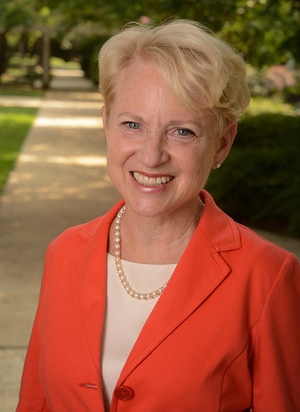
Laurie Robinson is George Mason University’s Clarence J. Robinson Professor Emerita of Criminology, Law and Society. She joined GMU in 2012 after more than three decades working on national criminal justice policy. In 2014, in the aftermath of Ferguson, President Obama named her to co-chair the White House Task Force on 21st Century Policing, charged with developing recommendations on building trust between law enforcement and communities. In 2014-16, she served on the Congressionally created Colson Task Force on federal prison crowding. She currently sits on the NYC Commission on closing Rikers Island, and chairs the Board of the Council on Criminal Justice, a national think tank advancing data-driven criminal justice policy choices.
Robinson twice served as a Senate-confirmed Assistant Attorney General heading the U.S. Department of Justice Office of Justice Programs, DOJ’s research, statistics and criminal justice assistance agency. Her three years of service in the Obama Administration, coupled with seven years under President Clinton, make her the longest serving head of that agency in its 50 years.
Between her stints in government, Robinson was the founding director of the University of Pennsylvania’s Criminology MS Program. During her first DOJ tenure in the ‘90s, she oversaw a $4 billion dollar budget and the largest increase in federal spending on crime-related research in the nation’s history, as well as spearheading major federal initiatives on violence against women and drug treatment courts. She has served on numerous national boards including the National Academies of Science Committee on Law and Justice.
 Jody Miller (she, her, hers) is a Distinguished Professor in the School of Criminal Justice at Rutgers University. Her research utilizes qualitative methods to investigate how inequalities of gender, race, sexuality and place shape participation in crime and risks for victimization, with concentrations in the United States and South Asia. Miller is Co-Director of the National Science Foundation-sponsored Racial Democracy, Crime and Justice Network (RDCJN) and Co-Editor of Criminology. She is a Fellow of the ASC, has served as ASC Vice President, and has won numerous awards for her work, including the 2015 ASC Mentor Award.
Jody Miller (she, her, hers) is a Distinguished Professor in the School of Criminal Justice at Rutgers University. Her research utilizes qualitative methods to investigate how inequalities of gender, race, sexuality and place shape participation in crime and risks for victimization, with concentrations in the United States and South Asia. Miller is Co-Director of the National Science Foundation-sponsored Racial Democracy, Crime and Justice Network (RDCJN) and Co-Editor of Criminology. She is a Fellow of the ASC, has served as ASC Vice President, and has won numerous awards for her work, including the 2015 ASC Mentor Award.
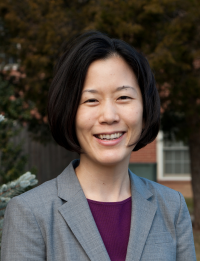 Dr. Cynthia Lum is University Professor of Criminology, Law and Society at George Mason University and Director of GMU’s Center for Evidence-Based Crime Policy. She was named a Fellow of the American Society of Criminology in 2021. She is a leading authority on evidence-based policing, an approach that advocates that research, evaluation, and scientific processes should have “a seat at the table” in law enforcement policymaking and practice. She has studied and written extensively about patrol operations and police crime prevention activities, police technology, investigations and detective work, and evidence-based crime policy. Additionally, she has developed numerous tools and strategies to translate and institutionalize research into everyday law enforcement operations. For her efforts, she received the Virginia State Council for Higher Education Outstanding Faculty Award, the commonwealth’s highest faculty honor and was the inaugural recipient of GMU’s Presidential Medal for Social Impact. Dr. Lum is an appointed member of the National Academies of Sciences Committee on Law and Justice, an appointed trustee to the Council on Criminal Justice, and a board director for the National Policing Institute. Dr. Lum has served numerous elected and appointed positions within the American Society of Criminology and is Co-Editor in Chief of Criminology & Public Policy, the society’s flagship policy journal. She is the founding editor of Translational Criminology Magazine. Professor Lum is a former police officer and detective.
Dr. Cynthia Lum is University Professor of Criminology, Law and Society at George Mason University and Director of GMU’s Center for Evidence-Based Crime Policy. She was named a Fellow of the American Society of Criminology in 2021. She is a leading authority on evidence-based policing, an approach that advocates that research, evaluation, and scientific processes should have “a seat at the table” in law enforcement policymaking and practice. She has studied and written extensively about patrol operations and police crime prevention activities, police technology, investigations and detective work, and evidence-based crime policy. Additionally, she has developed numerous tools and strategies to translate and institutionalize research into everyday law enforcement operations. For her efforts, she received the Virginia State Council for Higher Education Outstanding Faculty Award, the commonwealth’s highest faculty honor and was the inaugural recipient of GMU’s Presidential Medal for Social Impact. Dr. Lum is an appointed member of the National Academies of Sciences Committee on Law and Justice, an appointed trustee to the Council on Criminal Justice, and a board director for the National Policing Institute. Dr. Lum has served numerous elected and appointed positions within the American Society of Criminology and is Co-Editor in Chief of Criminology & Public Policy, the society’s flagship policy journal. She is the founding editor of Translational Criminology Magazine. Professor Lum is a former police officer and detective.
 Charis E. Kubrin is Professor of Criminology, Law & Society and (by courtesy) Sociology at the University of California, Irvine. She is a member of the Council on Criminal Justice, the Racial Democracy, Crime and Justice- Network, the Diversity Scholars Network, and the Scholars Strategy Network. She is an expert for the Crime and Justice Research Alliance. Dr. Kubrin’s policy-relevant research examines the immigration-crime nexus and considers the impact of immigration-related policy on immigrants, immigrant families and immigrant communities as well as assesses the impact of criminal justice reform on crime rates. Another line of research examines the use of rap lyrics as evidence in criminal trials against young men of color. Dr. Kubrin has received several national awards including the Ruth Shonle Cavan Young Scholar Award from the American Society of Criminology (for outstanding scholarly contributions to the discipline of criminology); the Coramae Richey Mann Award from the Division on People of Color and Crime, the American Society of Criminology (for outstanding contributions of scholarship on race/ethnicity, crime and justice); the W.E.B. DuBois Award from the Western Society of Criminology (for significant contributions to racial and ethnic issues in the field of criminology); and, the Paul Tappan Award from the Western Society of Criminology (for outstanding contributions to the field of criminology). In 2019, she was named a Fellow of the American Society of Criminology. Dr. Kubrin has served numerous elected and appointed positions within the American Society of Criminology, including as former Co-Editor of Criminology, as member of the Executive Board, and as Program Co-Chair for the 2024 annual meeting.
Charis E. Kubrin is Professor of Criminology, Law & Society and (by courtesy) Sociology at the University of California, Irvine. She is a member of the Council on Criminal Justice, the Racial Democracy, Crime and Justice- Network, the Diversity Scholars Network, and the Scholars Strategy Network. She is an expert for the Crime and Justice Research Alliance. Dr. Kubrin’s policy-relevant research examines the immigration-crime nexus and considers the impact of immigration-related policy on immigrants, immigrant families and immigrant communities as well as assesses the impact of criminal justice reform on crime rates. Another line of research examines the use of rap lyrics as evidence in criminal trials against young men of color. Dr. Kubrin has received several national awards including the Ruth Shonle Cavan Young Scholar Award from the American Society of Criminology (for outstanding scholarly contributions to the discipline of criminology); the Coramae Richey Mann Award from the Division on People of Color and Crime, the American Society of Criminology (for outstanding contributions of scholarship on race/ethnicity, crime and justice); the W.E.B. DuBois Award from the Western Society of Criminology (for significant contributions to racial and ethnic issues in the field of criminology); and, the Paul Tappan Award from the Western Society of Criminology (for outstanding contributions to the field of criminology). In 2019, she was named a Fellow of the American Society of Criminology. Dr. Kubrin has served numerous elected and appointed positions within the American Society of Criminology, including as former Co-Editor of Criminology, as member of the Executive Board, and as Program Co-Chair for the 2024 annual meeting.
GENE CARTE STUDENT PAPER AWARD RECIPIENTS
The Gene Carte Student Paper Award is given to recognize outstanding scholarly work of students.
The Gene Carte Student Paper Award was formally created in 1981, but student paper awards were given on a sporadic basis prior to that time. This list has been compiled using documents in the ASC archive. Unfortunately our archives are not complete and consequently this list cannot be considered definitive. Please report any errors or omissions to the ASC offices (kvance@asc41.org).
1972: Lawrence Rawlings, Self Control and Interpersonal Violence: A Study of Scottish Adolescent Male Severe Offenders
1973: C Ronald Huff, Unionization behind the Walls
1976: Gary S. Green, Measuring the Incapacitative Effectiveness of Fixed Punishment
1980: Thomas Gabor
1981: award not given
1982:
1983:
1984:
1985:
1986:
1987: First Place – Tamasak Witayapanyanon
1988: First Place – Paul Knepper
1989:
1990:
1991:
1992:
1993:
1994:
1995:
1996:
1997:
1998:
1999:
2000:
2001:
2002:
2003:
2004:
2005:
2006:
2007:
2008:
2009:
2010:
2011:
2012:
2013:
2014:
2015:
2016:
2017:
2018:
2019:
2020:
 Sadé L. Lindsay is an Assistant Research Professor in the Brooks School of Public Policy and Department of Sociology at Cornell University. She received her Ph.D. in Sociology and B.A. in Criminology from The Ohio State University in 2021 and 2015, respectively. Her research interests lie at the intersection of criminal justice, social inequality, and public policy. Specifically, she employs quantitative and qualitative methods to examine reentry and post-release employment, race and the criminalization of deviance, women’s incarceration experiences, and drug policy and use. Sadé’s research has been funded by various national organizations, including the National Science Foundation, the National Institute of Justice, the Horowitz Foundation for Social Policy. Her scholarship has also received numerous awards and been published in Social Problems and Journal of Research in Crime and Delinquency, among other outlets.
Sadé L. Lindsay is an Assistant Research Professor in the Brooks School of Public Policy and Department of Sociology at Cornell University. She received her Ph.D. in Sociology and B.A. in Criminology from The Ohio State University in 2021 and 2015, respectively. Her research interests lie at the intersection of criminal justice, social inequality, and public policy. Specifically, she employs quantitative and qualitative methods to examine reentry and post-release employment, race and the criminalization of deviance, women’s incarceration experiences, and drug policy and use. Sadé’s research has been funded by various national organizations, including the National Science Foundation, the National Institute of Justice, the Horowitz Foundation for Social Policy. Her scholarship has also received numerous awards and been published in Social Problems and Journal of Research in Crime and Delinquency, among other outlets.
_____________________ *** _____________________
 Chris is a doctoral candidate in the department of Sociology and Criminology at the Pennsylvania State University. His research interests include crime, health, and religion, especially how religion influences attitudes and behaviors at both the individual and group levels. Chris is also interested in the application of machine learning methods and big social data to better understand these phenomena.
Chris is a doctoral candidate in the department of Sociology and Criminology at the Pennsylvania State University. His research interests include crime, health, and religion, especially how religion influences attitudes and behaviors at both the individual and group levels. Chris is also interested in the application of machine learning methods and big social data to better understand these phenomena.
_____________________ *** _____________________
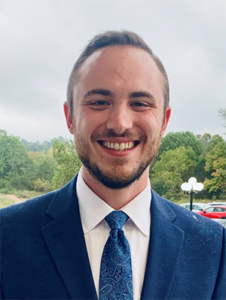 Bradley O’Guinn is a doctoral student at the University of Cincinnati’s School of Criminal Justice. His research interests include police effectiveness, crime and place, and police organizations. He received his BA and MA from Southern Illinois University Carbondale.
Bradley O’Guinn is a doctoral student at the University of Cincinnati’s School of Criminal Justice. His research interests include police effectiveness, crime and place, and police organizations. He received his BA and MA from Southern Illinois University Carbondale.
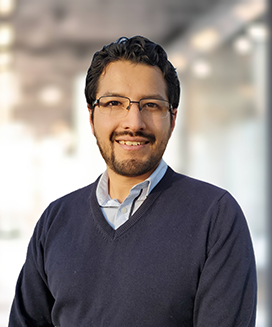 David Mitre Becerril is a doctoral candidate in Criminology at the University of Pennsylvania, born and raised in Mexico. He received an MS in Public Policy and Management from Carnegie Mellon University (highest distinction), a BA in Economics from the Instituto Tecnológico Autónomo de Mexico (award-winning thesis), and a BA in Political Science from the Universidad Nacional Autónoma de Mexico. Before graduate school, David worked as a data analyst at the Mexican census bureau’s public safety and justice unit and as an economist at a government research agency. He is driven to conduct crime research and provide policy recommendations using evidence-based decision-making.
David Mitre Becerril is a doctoral candidate in Criminology at the University of Pennsylvania, born and raised in Mexico. He received an MS in Public Policy and Management from Carnegie Mellon University (highest distinction), a BA in Economics from the Instituto Tecnológico Autónomo de Mexico (award-winning thesis), and a BA in Political Science from the Universidad Nacional Autónoma de Mexico. Before graduate school, David worked as a data analyst at the Mexican census bureau’s public safety and justice unit and as an economist at a government research agency. He is driven to conduct crime research and provide policy recommendations using evidence-based decision-making.
David’s research interests lie in understanding the causes and consequences of crime and violence, mainly how place-based interventions affect public safety and the role of income in deterring criminal behaviors. His broad research question is how local private and public investments can encourage (if any) safer neighborhoods. His work has appeared in Criminology & Public Policy.
_____________________ *** _____________________
 Said Hassan is a PhD candidate in Sociology at the University of Oxford (Nuffield College) where he also earned his MPhil degree in Sociology and Demography. In his doctoral research, he explores how residential environments and school contexts interact to produce social inequalities in modern welfare states.
Said Hassan is a PhD candidate in Sociology at the University of Oxford (Nuffield College) where he also earned his MPhil degree in Sociology and Demography. In his doctoral research, he explores how residential environments and school contexts interact to produce social inequalities in modern welfare states.
_____________________ *** _____________________
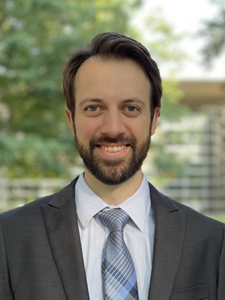 Stephen Oliphant is a doctoral candidate in the School of Criminal Justice at Michigan State University. He received a Master of Public Policy and a certificate in Injury Science from the Gerald R. Ford School of Public Policy at the University of Michigan. His research interests include firearm policy, violence prevention, and capital punishment. Stephen was a co-recipient of the Brooks Webb Student Paper Award at the 2022 Society for Advancement of Violence and Injury Research conference. His work appears in the Journal of Behavioral Medicine, Youth & Society, Journal of Urban Health, Injury Prevention, and Criminology & Public Policy.
Stephen Oliphant is a doctoral candidate in the School of Criminal Justice at Michigan State University. He received a Master of Public Policy and a certificate in Injury Science from the Gerald R. Ford School of Public Policy at the University of Michigan. His research interests include firearm policy, violence prevention, and capital punishment. Stephen was a co-recipient of the Brooks Webb Student Paper Award at the 2022 Society for Advancement of Violence and Injury Research conference. His work appears in the Journal of Behavioral Medicine, Youth & Society, Journal of Urban Health, Injury Prevention, and Criminology & Public Policy.
 Garrett Baker is a PhD candidate at Duke University in the Department of Sociology and the Sanford School of Public Policy. He received his BA from Wake Forest University and MSEd from the University of Pennsylvania. Garrett’s research focuses on how institutions of social control—in particular, the criminal justice, child welfare, and education systems—reflect and exacerbate inequality. He is also interested in quantitative methods broadly defined, and his work draws especially from techniques in causal inference, demography, and structural equation modeling. His research has been published in Sociological Science and Children and Youth Services Review.
Garrett Baker is a PhD candidate at Duke University in the Department of Sociology and the Sanford School of Public Policy. He received his BA from Wake Forest University and MSEd from the University of Pennsylvania. Garrett’s research focuses on how institutions of social control—in particular, the criminal justice, child welfare, and education systems—reflect and exacerbate inequality. He is also interested in quantitative methods broadly defined, and his work draws especially from techniques in causal inference, demography, and structural equation modeling. His research has been published in Sociological Science and Children and Youth Services Review.
_____________________ *** _____________________
 Abby Ballou is a doctoral candidate in the School of Criminology and Criminal Justice at Northeastern University. Her research explores how postsecondary education credentials earned while incarcerated impact post-release labor market outcomes. Outside of school, Abby is an instructor for Boston University’s Prison Education Program. She holds a BA and an MPhil in English Literature.
Abby Ballou is a doctoral candidate in the School of Criminology and Criminal Justice at Northeastern University. Her research explores how postsecondary education credentials earned while incarcerated impact post-release labor market outcomes. Outside of school, Abby is an instructor for Boston University’s Prison Education Program. She holds a BA and an MPhil in English Literature.
_____________________ *** _____________________
 Chiara C. Packard is a PhD candidate in the Department of Sociology at the University of Wisconsin-Madison. Her research uses primarily qualitative methods to explore the political and social processes that shape punishment, and how punishment, in turn, reproduces inequality. Her work has won several awards and been published in peer-reviewed journals, including Law & Social Inquiry and Violence Against Women. Chiara’s dissertation specifically draws on twelve months of ethnographic fieldwork in two midwestern District Attorney’s offices to investigate how prosecutors make decisions about charging, plea-bargaining, and sentencing recommendations. This project has been supported by the American Sociological Association Doctoral Dissertation Research Improvement Grant (ASA DDRIG) and the Institute for Research on Poverty Dissertation Research Fellowship.
Chiara C. Packard is a PhD candidate in the Department of Sociology at the University of Wisconsin-Madison. Her research uses primarily qualitative methods to explore the political and social processes that shape punishment, and how punishment, in turn, reproduces inequality. Her work has won several awards and been published in peer-reviewed journals, including Law & Social Inquiry and Violence Against Women. Chiara’s dissertation specifically draws on twelve months of ethnographic fieldwork in two midwestern District Attorney’s offices to investigate how prosecutors make decisions about charging, plea-bargaining, and sentencing recommendations. This project has been supported by the American Sociological Association Doctoral Dissertation Research Improvement Grant (ASA DDRIG) and the Institute for Research on Poverty Dissertation Research Fellowship.
 Taylor Domingos is a PhD student in Sociology at Northwestern University. She holds both a BA and MA from the University of Toronto. Her research explores the intersection of gender and crime, with a particular focus on police violence and sexual violence in incarceration, examining how these forms of violence may be shaped by gender. Taylor’s work is supported by the Social Sciences and Humanities Research Council of Canada, and her research has been published in Socius: Sociological Research for a Dynamic World and Feminist Criminology.
Taylor Domingos is a PhD student in Sociology at Northwestern University. She holds both a BA and MA from the University of Toronto. Her research explores the intersection of gender and crime, with a particular focus on police violence and sexual violence in incarceration, examining how these forms of violence may be shaped by gender. Taylor’s work is supported by the Social Sciences and Humanities Research Council of Canada, and her research has been published in Socius: Sociological Research for a Dynamic World and Feminist Criminology.
_____________________ *** _____________________
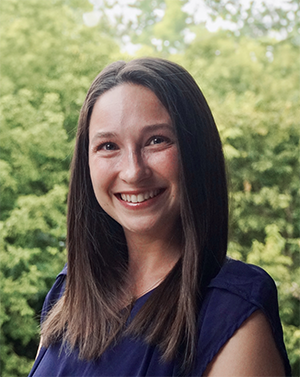 Avery Warner is a doctoral candidate in the Department of Sociology at the University of Wisconsin-Madison. Graduating summa cum laude from the University of Georgia, her research explores social inequality and the ways in which the criminal justice system and legal institutions perpetuate and reinforce racial, class, and gender inequalities. Her current work takes a policy-oriented approach to noncitizen punishment to understand the intersections of race, ethnicity, citizenship, and gender.
Avery Warner is a doctoral candidate in the Department of Sociology at the University of Wisconsin-Madison. Graduating summa cum laude from the University of Georgia, her research explores social inequality and the ways in which the criminal justice system and legal institutions perpetuate and reinforce racial, class, and gender inequalities. Her current work takes a policy-oriented approach to noncitizen punishment to understand the intersections of race, ethnicity, citizenship, and gender.
_____________________ *** _____________________
 Abby Ballou is a doctoral candidate in the School of Criminology and Criminal Justice at Northeastern University, where her work focuses on prison education programming and positive credentials as a means of neutralizing criminal stigma. Her research has been published in Criminology and is supported by the National Institute of Justice’s Graduate Research Fellowship.
Abby Ballou is a doctoral candidate in the School of Criminology and Criminal Justice at Northeastern University, where her work focuses on prison education programming and positive credentials as a means of neutralizing criminal stigma. Her research has been published in Criminology and is supported by the National Institute of Justice’s Graduate Research Fellowship.
RUTH SHONLE CAVAN YOUNG SCHOLAR AWARD RECIPIENTS
The Ruth Shonle Cavan Young Scholar Award is given to recognize outstanding scholarly contributions to the discipline of criminology by someone who has received the Ph.D., MD, LL.D. or a similar graduate degree no more than five years before the year of the award.
1997: David A. Klinger
1998: Lisa A. Maher
1999: Richard A. Leo
2000: Christopher Uggen
2001: Jody Miller
2002: Alex R. Piquero & Eric Silver
2003: Eric Baumer
2004: Jeffrey D. Morenoff
2005: Charis Kubrin
2006: Travis Pratt
2007: Aaron Kupchik
2008: Brian D. Johnson
2009: Kevin Beaver
2010: John Hipp
2011: Derek Kreager
2012: Andrew Papachristos & Min Xie
2013: Christopher Wildeman
2014: Callie Burt
2015: Justin Pickett
2016: David C. Pyrooz
2017: Keramet Reiter
2018: Hollie Nyseth Brehm
2019: Jillian Turanovic
2020: Holly Nguyen
 Megan Denver is an assistant professor in the School of Criminology and Criminal Justice at Northeastern University. Her research interests include criminal background checks, employment and recidivism, criminal record stigma, and desistance. She received her Ph.D. in Criminal Justice from the University at Albany and her BA and MA from the University of Delaware. Megan was previously a research associate at the Urban Institute before returning to graduate school and an assistant professor at Florida State University before joining Northeastern.
Megan Denver is an assistant professor in the School of Criminology and Criminal Justice at Northeastern University. Her research interests include criminal background checks, employment and recidivism, criminal record stigma, and desistance. She received her Ph.D. in Criminal Justice from the University at Albany and her BA and MA from the University of Delaware. Megan was previously a research associate at the Urban Institute before returning to graduate school and an assistant professor at Florida State University before joining Northeastern.
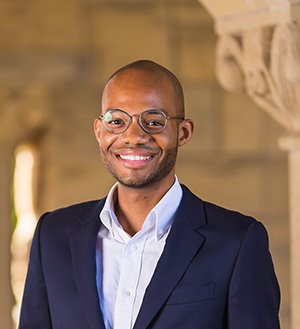 Dr. Matthew Clair is Assistant Professor in the Department of Sociology and (by courtesy) the Law School at Stanford University. His scholarship examines inequality in the criminal legal system, legal institutions, and the legal profession. He is the author of the award-winning book Privilege and Punishment: How Race and Class Matter in Criminal Court (Princeton University Press, 2020). In addition, he has published in several academic and popular outlets, including Criminology, Law & Society Review, California Law Review, Social Forces, Du Bois Review, The Nation, and Public Books. He has received funding from the National Science Foundation and awards from the American Society of Criminology, the American Sociological Association, the Law & Society Association, and the Society for the Study of Social Problems. Prior to joining Stanford, Dr. Clair was a postdoctoral fellow at the University of Pennsylvania Law School’s Quattrone Center for the Fair Administration of Justice. He holds an A.B. in Government from Harvard College and an A.M. and Ph.D. in Sociology from Harvard University.
Dr. Matthew Clair is Assistant Professor in the Department of Sociology and (by courtesy) the Law School at Stanford University. His scholarship examines inequality in the criminal legal system, legal institutions, and the legal profession. He is the author of the award-winning book Privilege and Punishment: How Race and Class Matter in Criminal Court (Princeton University Press, 2020). In addition, he has published in several academic and popular outlets, including Criminology, Law & Society Review, California Law Review, Social Forces, Du Bois Review, The Nation, and Public Books. He has received funding from the National Science Foundation and awards from the American Society of Criminology, the American Sociological Association, the Law & Society Association, and the Society for the Study of Social Problems. Prior to joining Stanford, Dr. Clair was a postdoctoral fellow at the University of Pennsylvania Law School’s Quattrone Center for the Fair Administration of Justice. He holds an A.B. in Government from Harvard College and an A.M. and Ph.D. in Sociology from Harvard University.
 Scott is an assistant professor of sociology at the University of North Carolina at Chapel Hill. His research examines the historical origins of mass incarceration, race in the criminal justice system, online drug markets, network criminology, public opinion and crime policy, and quantitative methods for social network and panel data. His research has appeared in American Sociological Review, American Journal of Sociology, Criminology, Journal of Quantitative Criminology, Social Forces, Sociological Methods & Research, and Social Problems, among other outlets. It has been supported by the National Science Foundation and has received awards from the American Society of Criminology and American Sociological Association sections on Crime, Law, and Deviance, Mathematical Sociology, Methodology, and Communication, Information Technology, and Media Sociology. Most recently, Scott was the recipient of the ASC Division of Public Opinion and Policy’s inaugural Young Scholar Award. Scott has also developed and currently maintains the R software packages ergMargins, netmediate, and rewie for panel and network data analysis. Prior to joining UNC, Scott received his PhD in Sociology from Ohio State University in 2020, where he benefited from the outstanding mentorship of Dr. Dana Haynie, Dr. David Melamed, and Dr. Ryan King. His recent little green book Longitudinal Network Models (SAGE) provides an introductory text to analyzing longitudinal network data.
Scott is an assistant professor of sociology at the University of North Carolina at Chapel Hill. His research examines the historical origins of mass incarceration, race in the criminal justice system, online drug markets, network criminology, public opinion and crime policy, and quantitative methods for social network and panel data. His research has appeared in American Sociological Review, American Journal of Sociology, Criminology, Journal of Quantitative Criminology, Social Forces, Sociological Methods & Research, and Social Problems, among other outlets. It has been supported by the National Science Foundation and has received awards from the American Society of Criminology and American Sociological Association sections on Crime, Law, and Deviance, Mathematical Sociology, Methodology, and Communication, Information Technology, and Media Sociology. Most recently, Scott was the recipient of the ASC Division of Public Opinion and Policy’s inaugural Young Scholar Award. Scott has also developed and currently maintains the R software packages ergMargins, netmediate, and rewie for panel and network data analysis. Prior to joining UNC, Scott received his PhD in Sociology from Ohio State University in 2020, where he benefited from the outstanding mentorship of Dr. Dana Haynie, Dr. David Melamed, and Dr. Ryan King. His recent little green book Longitudinal Network Models (SAGE) provides an introductory text to analyzing longitudinal network data.
 Emma E. Fridel is an assistant professor in the College of Criminology and Criminal Justice at Florida State University. She received her Ph.D. in Criminology and Justice Policy from Northeastern University. She primarily studies violence and aggression with a focus on homicide, including gun violence, school violence, homicide–suicide, serial and mass murder, and fatal officer-citizen encounters. Dr. Fridel’s work has been published in Criminology, Social Forces, the Journal of Research in Crime and Delinquency, and Justice Quarterly, and she is a co-author of Extreme Killing: Understanding Serial and Mass Murder.
Emma E. Fridel is an assistant professor in the College of Criminology and Criminal Justice at Florida State University. She received her Ph.D. in Criminology and Justice Policy from Northeastern University. She primarily studies violence and aggression with a focus on homicide, including gun violence, school violence, homicide–suicide, serial and mass murder, and fatal officer-citizen encounters. Dr. Fridel’s work has been published in Criminology, Social Forces, the Journal of Research in Crime and Delinquency, and Justice Quarterly, and she is a co-author of Extreme Killing: Understanding Serial and Mass Murder.
DU BOIS AWARD
The W.E.B. Du Bois Research Award (established in 2023) is given to recognize transformative scholarship that engages criminology, criminal justice and race/ethnicity.
LIST OF ASC FELLOWS
Those designated as Fellows are recognized for their scholarly contributions to criminology and distinction in the discipline.
The year these individuals were designated as Fellows is noted. Unfortunately, our historical records are not complete. Some of the years noted are a “best guess,” based on available archived documents. If you have more accurate information, please contact Chris Eskridge.
GRADUATE STUDENT POSTER COMPETITION AWARD RECIPIENTS
The Graduate Student Poster Competition (established 2020) is given to recognize outstanding scientific merit and visual appeal of work by students.
 Vitor Gonçalves earned a B.A. in Public Administration from the João Pinheiro School of Government (Brazil) in 2015 and an M.A. in Sociology from Federal University of Minas Gerais (UFMG-Brazil) in 2019. He has previously taught the course of Criminal Justice System and Public Security Policies (2020) for undergraduate students at the João Pinheiro School of Government. He has been a Specialist in the government of the State of Minas Gerais (2016-present). He is currently a researcher in the Center for Studies on Criminality and Public Safety at UFMG and a Ph.D. student in the School of Criminal Justice and Criminology at Texas State University. His interests include juvenile justice, sentencing, and criminological theories.
Vitor Gonçalves earned a B.A. in Public Administration from the João Pinheiro School of Government (Brazil) in 2015 and an M.A. in Sociology from Federal University of Minas Gerais (UFMG-Brazil) in 2019. He has previously taught the course of Criminal Justice System and Public Security Policies (2020) for undergraduate students at the João Pinheiro School of Government. He has been a Specialist in the government of the State of Minas Gerais (2016-present). He is currently a researcher in the Center for Studies on Criminality and Public Safety at UFMG and a Ph.D. student in the School of Criminal Justice and Criminology at Texas State University. His interests include juvenile justice, sentencing, and criminological theories.
_____________________ *** _____________________
 Qian “chien” He (she/her) is a Ph.D. Candidate in Urban Planning and Public Policy and an Instructor at the Department of Public Affairs and Planning at the University of Texas at Arlington. Qian’s research focuses on environmental equity and community development through the aspects of public transit, neighborhood safety, and public health. She is particularly interested in examining how urban planning policies shape health outcomes and the well-being of historically disadvantaged and underrepresented communities.
Qian “chien” He (she/her) is a Ph.D. Candidate in Urban Planning and Public Policy and an Instructor at the Department of Public Affairs and Planning at the University of Texas at Arlington. Qian’s research focuses on environmental equity and community development through the aspects of public transit, neighborhood safety, and public health. She is particularly interested in examining how urban planning policies shape health outcomes and the well-being of historically disadvantaged and underrepresented communities.
Qian’s dissertation explores the social determinants of mental health under the impacts of urban environments and social equity. The question that she addresses is whether neighborhood environmental characteristics (including land-use pattern, housing characteristics, walkability, transportation access, socioeconomic structure, and concentrated disadvantage) could mediate or exacerbate crime’s impact on mental health status. Qian conceptualizes “crime” as the main measurement for environmental stressor in urban communities – one aspect that has been overlooked by existing urban planning literature. Her research bridges the gap in the field by emphasizing how built environment and social environment interrelatedly determine people’s well-being with an emphasis on the impact of racial justice and environmental equity. Using a five year panel dataset (2015-2019) from the Dallas-Fort Worth metropolitan area (TX) and a spatial-econometric approach, the findings contribute to the field by illuminating the impact of neighborhood environment on mental health outcome, demonstrating the role of collective efficacy in community development, and developing a framework for healthy and resilient community.
_____________________ *** _____________________
 Jennifer Smith is a lecturer in criminal justice in the School of Public Affairs at Penn State Harrisburg where she teaches Introduction to Criminal Justice, Criminology, and Juvenile Justice courses. She received both her B.S. and M.A. in criminal justice from Penn State Harrisburg. She is currently enrolled in Indiana University of Pennsylvania’s Ph.D. program in Administration and Leadership Studies for Nonprofit and Public Sectors. Jennifer’s research interests include corrections policy, juvenile justice, juvenile delinquency and the scholarship of teaching and learning.
Jennifer Smith is a lecturer in criminal justice in the School of Public Affairs at Penn State Harrisburg where she teaches Introduction to Criminal Justice, Criminology, and Juvenile Justice courses. She received both her B.S. and M.A. in criminal justice from Penn State Harrisburg. She is currently enrolled in Indiana University of Pennsylvania’s Ph.D. program in Administration and Leadership Studies for Nonprofit and Public Sectors. Jennifer’s research interests include corrections policy, juvenile justice, juvenile delinquency and the scholarship of teaching and learning.
_______________________________________________________________________________________________________
 Byunggu Kang is a doctoral candidate in the School of Criminal Justice at the University at Albany, SUNY. His research falls at the intersection of criminology, demography, and public health. He is also interested in using data visualization techniques to effectively communicate research findings and engage with public audiences. His dissertation examines to what extent and how age, period, and cohort effects contributes to the age–crime relationship in South Korea during the last four decades.
Byunggu Kang is a doctoral candidate in the School of Criminal Justice at the University at Albany, SUNY. His research falls at the intersection of criminology, demography, and public health. He is also interested in using data visualization techniques to effectively communicate research findings and engage with public audiences. His dissertation examines to what extent and how age, period, and cohort effects contributes to the age–crime relationship in South Korea during the last four decades.
_____________________ *** _____________________
 I am a second-year Ph.D. student in Criminology at Dongguk University, Seoul, Republic of Korea. I received my bachelor’s degree in Buddhism and master’s degree in Criminal Psychology from Dongguk University. My research interests focus on the developmental trajectory of juvenile delinquency, the Influence of social media services on fear of crime, and the potential of smart policing technology. My master’s thesis, “The Effect of Differential Association and General Strain on Juvenile Delinquency and Moderating Effects of Religion Activities”, received the Best Thesis Award from KOSSDA (Korea Social Science Data Archive) 2020. As an assistant researcher, I have participated in several research projects, including “Development of a Standard Model for Job Diagnosis of Investigation Departments” collaborating with the Korea National Police Agency from 2021-2022, and “Prevention policies for recidivism of juveniles on probation during the night time” collaborating with the Probation Office, Ministry of Justice, Korea in 2021. Currently, I am conducting a study to evaluate the real condition of CPTED (Crime Prevention Through Environmental Design) project and the crime prevention effect on the community in collaboration with the Korea National Police Agency. I have been also counseling probation youth as a Co-counselor at the Probation Office, Ministry of Justice, Korea, since 2020.
I am a second-year Ph.D. student in Criminology at Dongguk University, Seoul, Republic of Korea. I received my bachelor’s degree in Buddhism and master’s degree in Criminal Psychology from Dongguk University. My research interests focus on the developmental trajectory of juvenile delinquency, the Influence of social media services on fear of crime, and the potential of smart policing technology. My master’s thesis, “The Effect of Differential Association and General Strain on Juvenile Delinquency and Moderating Effects of Religion Activities”, received the Best Thesis Award from KOSSDA (Korea Social Science Data Archive) 2020. As an assistant researcher, I have participated in several research projects, including “Development of a Standard Model for Job Diagnosis of Investigation Departments” collaborating with the Korea National Police Agency from 2021-2022, and “Prevention policies for recidivism of juveniles on probation during the night time” collaborating with the Probation Office, Ministry of Justice, Korea in 2021. Currently, I am conducting a study to evaluate the real condition of CPTED (Crime Prevention Through Environmental Design) project and the crime prevention effect on the community in collaboration with the Korea National Police Agency. I have been also counseling probation youth as a Co-counselor at the Probation Office, Ministry of Justice, Korea, since 2020.
_____________________ *** _____________________
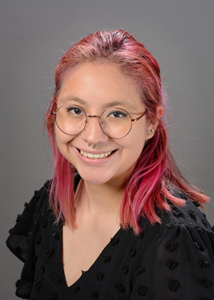 Veyli Ortiz Solis earned her B.S. and M.A. in Criminal Justice from the University of Massachusetts – Lowell. She is currently a Ph.D. student in the Criminology and Criminal Justice program at the University of Maryland – College Park. She is also a research assistant for projects on the victimization of immigrants and persons with disabilities. Her research interests lie in the study of victimology, with a particular focus on marginalized communities. Veyli’s research centers on discrimination, intimate partner violence, and labor trafficking victimization.
Veyli Ortiz Solis earned her B.S. and M.A. in Criminal Justice from the University of Massachusetts – Lowell. She is currently a Ph.D. student in the Criminology and Criminal Justice program at the University of Maryland – College Park. She is also a research assistant for projects on the victimization of immigrants and persons with disabilities. Her research interests lie in the study of victimology, with a particular focus on marginalized communities. Veyli’s research centers on discrimination, intimate partner violence, and labor trafficking victimization.
_____________________ *** _____________________
 Alvi Ali (she/her) earned a B.A. in Criminology from the University of Texas at Dallas in 2019 and an M.S. in Criminal Justice from Texas State University in 2022. She is a Ph.D. student in the School of Criminology and Criminal Justice at the University of Nebraska at Omaha (UNO). She has previously worked with law enforcement on crime analysis and has experience in intellectual property brand protection. She is currently a research assistant at the Victimology and Victim Studies Research Lab at UNO. Her research interests include sexual offending, sexual victimization, and cultural violence.
Alvi Ali (she/her) earned a B.A. in Criminology from the University of Texas at Dallas in 2019 and an M.S. in Criminal Justice from Texas State University in 2022. She is a Ph.D. student in the School of Criminology and Criminal Justice at the University of Nebraska at Omaha (UNO). She has previously worked with law enforcement on crime analysis and has experience in intellectual property brand protection. She is currently a research assistant at the Victimology and Victim Studies Research Lab at UNO. Her research interests include sexual offending, sexual victimization, and cultural violence.
_______________________________________________________________________________________________________
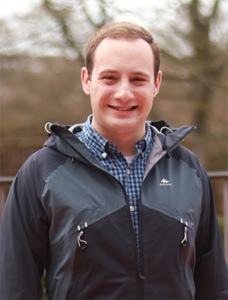 Nicholas Goldrosen is a Ph.D. candidate at the Institute of Criminology, University of Cambridge. He received his M.Phil. from Cambridge and B.A. from Williams College. Nicholas’ dissertation research focuses on causes of and responses to law enforcement misconduct; methodologically, his work draws on social network analysis, causal inference, and qualitative methods in penal theory. His other research interests include sentencing, drug enforcement, and state preemption of local criminal justice reform. He has research published or forthcoming in the Ohio State Journal of Criminal Law, Journal of Institutional and Theoretical Economics, and Criminology, Criminal Justice, Law & Society. His work is supported by the Gates Cambridge Trust.
Nicholas Goldrosen is a Ph.D. candidate at the Institute of Criminology, University of Cambridge. He received his M.Phil. from Cambridge and B.A. from Williams College. Nicholas’ dissertation research focuses on causes of and responses to law enforcement misconduct; methodologically, his work draws on social network analysis, causal inference, and qualitative methods in penal theory. His other research interests include sentencing, drug enforcement, and state preemption of local criminal justice reform. He has research published or forthcoming in the Ohio State Journal of Criminal Law, Journal of Institutional and Theoretical Economics, and Criminology, Criminal Justice, Law & Society. His work is supported by the Gates Cambridge Trust.
_____________________ *** _____________________
 Julio Montanez, M.A., is a doctoral student in the Department of Sociology at the University of Central Florida. His research focuses on the intersection of interpersonal violence (particularly, intimate partner violence), public policy, and social inequalities. He is particularly interested in the socio-legal approach to understanding victimization laws that impact marginalized groups (e.g., undocumented survivors). In addition to conducting research, Julio has also taught a course entitled Patterns of Domestic Violence in Society. In his free time, Julio enjoys percussion/drumming and being with family.
Julio Montanez, M.A., is a doctoral student in the Department of Sociology at the University of Central Florida. His research focuses on the intersection of interpersonal violence (particularly, intimate partner violence), public policy, and social inequalities. He is particularly interested in the socio-legal approach to understanding victimization laws that impact marginalized groups (e.g., undocumented survivors). In addition to conducting research, Julio has also taught a course entitled Patterns of Domestic Violence in Society. In his free time, Julio enjoys percussion/drumming and being with family.
_____________________ *** _____________________
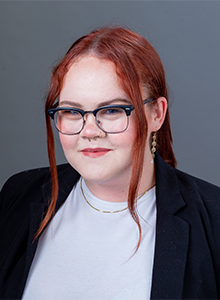 Jessica is a second-year master’s student at the University of Maryland. She completed her undergraduate degrees in criminology and women’s studies at the Pennsylvania State University in 2022, under the guidance of Caren Bloom-Steidle, J.D. As an undergraduate, Jessica’s interests were largely concentrated in domestic violence in minority communities, specifically the queer and/or dis/abled communities. After beginning her academic career at Maryland, she began studying the experiences of these individuals in the United States carceral system, with more of a specific focus on the queer community and the things that may be associated with increased punitiveness in the system. She is set to complete her master’s thesis this spring, on the same topic as this poster: what, if any, crimes are queer individuals more likely to be incarcerated for than non-queer individuals, accompanied by a theoretical analysis and explanation. Thanks are in order: first, to Wade Jacobsen, Sarah Tahamont, and Rob Stewart, Jessica’s thesis committee. Each one of these individuals has provided her with unique support in their specialties that is second to none. Without each of their support, this project, and this award, would have never happened. Second, to her cohort, without whose unending support Jessica could have never made it through her first year. The sisterhood in this cohort is strong, and has made all the difference in Jessica’s graduate career. Finally, to the ASC, for this honor that has made her feel so proud of, and prepared for, the research career that she works toward every day.
Jessica is a second-year master’s student at the University of Maryland. She completed her undergraduate degrees in criminology and women’s studies at the Pennsylvania State University in 2022, under the guidance of Caren Bloom-Steidle, J.D. As an undergraduate, Jessica’s interests were largely concentrated in domestic violence in minority communities, specifically the queer and/or dis/abled communities. After beginning her academic career at Maryland, she began studying the experiences of these individuals in the United States carceral system, with more of a specific focus on the queer community and the things that may be associated with increased punitiveness in the system. She is set to complete her master’s thesis this spring, on the same topic as this poster: what, if any, crimes are queer individuals more likely to be incarcerated for than non-queer individuals, accompanied by a theoretical analysis and explanation. Thanks are in order: first, to Wade Jacobsen, Sarah Tahamont, and Rob Stewart, Jessica’s thesis committee. Each one of these individuals has provided her with unique support in their specialties that is second to none. Without each of their support, this project, and this award, would have never happened. Second, to her cohort, without whose unending support Jessica could have never made it through her first year. The sisterhood in this cohort is strong, and has made all the difference in Jessica’s graduate career. Finally, to the ASC, for this honor that has made her feel so proud of, and prepared for, the research career that she works toward every day.
_______________________________________________________________________________________________________
 Shujing Shi is a PhD candidate at the Institute of Criminology, University of Cambridge. She holds an M.Sc. in Criminology from the University of Pennsylvania and a B.A. in Criminology from Durham University. Her PhD research focuses on organised crime and drug markets, with an emphasis on the group dynamics and operational mechanisms of organised drug trafficking networks. In addition, her broader academic interests include drug policy, evidence-based policing and community corrections.
Shujing Shi is a PhD candidate at the Institute of Criminology, University of Cambridge. She holds an M.Sc. in Criminology from the University of Pennsylvania and a B.A. in Criminology from Durham University. Her PhD research focuses on organised crime and drug markets, with an emphasis on the group dynamics and operational mechanisms of organised drug trafficking networks. In addition, her broader academic interests include drug policy, evidence-based policing and community corrections.
_____________________ *** _____________________
 Carisma Jano is a second-year student at the University of Nebraska Omaha (UNO), pursuing a Master’s degree in Criminology and Criminal Justice. With a passion for both social justice and community development, Carisma has developed a strong foundation in criminal law, criminology, and public policy. Her academic journey has equipped her with valuable insights into the complexities of the criminal justice system and its impact on communities, particularly in urban settings.
Carisma Jano is a second-year student at the University of Nebraska Omaha (UNO), pursuing a Master’s degree in Criminology and Criminal Justice. With a passion for both social justice and community development, Carisma has developed a strong foundation in criminal law, criminology, and public policy. Her academic journey has equipped her with valuable insights into the complexities of the criminal justice system and its impact on communities, particularly in urban settings.
Alongside her studies, Carisma serves as the Real Estate Manager for the Omaha Municipal Land Bank (OMLB), where she plays a pivotal role in advancing property redevelopment initiatives. Her work at OMLB involves managing a diverse portfolio of properties, facilitating real estate transactions, and collaborating with community partners to support neighborhood revitalization efforts.
With a Bachelor’s Degree in Journalism, Carisma is able to leverage her background to further enhance her communication and transparency skills in engaging with stakeholders to foster collaboration. Carisma is deeply committed to improving housing accessibility and addressing blight in Omaha’s neighborhoods, while also contributing to meaningful discussions on social equity and justice through her academic and professional roles.
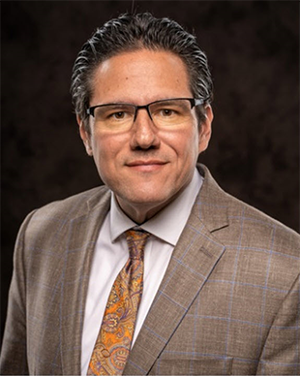 Jeff Peterson is currently working on Master’s degree in Criminology and Criminal Justice at the University of Nebraska Omaha (UNO), with a passion of statistical analysis and a foundation of data mining. Jeff completed his Bachelor’s Degree in Criminal Justice from UNO in 1993, a short 31 years ago. Jeff is the Lincoln Police Department (LPD) Crime Analysis Unit Manager and has been with LPD for 9 years. Jeff oversees a Crime Analysis unit of 5 co-workers that provide various data mining to assist in statistical analysis, investigative analysis, and intelligence analysis. If you wish to hear about one of Jeff’s passions, ask him about the “P’s of Crime Analysis.” Prior to working for LPD, Jeff worked for Nebraska Department of Correctional Services (NDCS) for 22 years. Jeff worked through the ranks with NDCS starting as a Correctional Officer through the rank of Captain. Jeff also taught Emergency Preparedness with NDCS for three year and his last 9 year was an intelligence analyst. One of Jeff’s hobbies is his photography and his ever growing of 88K photos on his phone and over 160K photos in his collection.
Jeff Peterson is currently working on Master’s degree in Criminology and Criminal Justice at the University of Nebraska Omaha (UNO), with a passion of statistical analysis and a foundation of data mining. Jeff completed his Bachelor’s Degree in Criminal Justice from UNO in 1993, a short 31 years ago. Jeff is the Lincoln Police Department (LPD) Crime Analysis Unit Manager and has been with LPD for 9 years. Jeff oversees a Crime Analysis unit of 5 co-workers that provide various data mining to assist in statistical analysis, investigative analysis, and intelligence analysis. If you wish to hear about one of Jeff’s passions, ask him about the “P’s of Crime Analysis.” Prior to working for LPD, Jeff worked for Nebraska Department of Correctional Services (NDCS) for 22 years. Jeff worked through the ranks with NDCS starting as a Correctional Officer through the rank of Captain. Jeff also taught Emergency Preparedness with NDCS for three year and his last 9 year was an intelligence analyst. One of Jeff’s hobbies is his photography and his ever growing of 88K photos on his phone and over 160K photos in his collection.
_____________________ *** _____________________
 Dylan is a PhD Candidate at Rutgers University-Camden in the Department of Public Affairs/Community Development. She is a community-engaged scholar focusing on labor, immigration, and organizing. Her work seeks to understand how migrant labor intersects with carceral state apparatuses.
Dylan is a PhD Candidate at Rutgers University-Camden in the Department of Public Affairs/Community Development. She is a community-engaged scholar focusing on labor, immigration, and organizing. Her work seeks to understand how migrant labor intersects with carceral state apparatuses.
Her dissertation examines migrant worker experiences and root causes of labor exploitation across the tech sector. Her ASC poster presents one aspect of this work, which explores how tech companies lobby for policies that actively shape precarity by increasing frictions in the workforce.
Dylan is the Cities and Justice Initiative lead at the Center for Urban Research and Education (CURE) at Rutgers University – Camden. At CURE, she focuses on social movements, and her work has included partnering with California organizers to advocate for ending slavery in prisons and a study on community pushes for universities to commit to Payments in Lieu of Taxes (PILOTs). In the summer of 2024, Dylan was a CURE Community First Fellow and worked with Philadelphia’s No Arena Chinatown movement to help raise awareness about the citywide impacts of the potential arena.
Dylan received her Masters in Legal Studies from Drexel University and was a 2018 Fulbright and Boren fellow in Taiwan. In Taiwan, she studied human trafficking in the fishing industry and shadowed the Yilan Migrant Fishermen’s Union. She received the 2020 Youth Human Rights Award from the United Nations for a report on the living and working conditions of the fishermen’s union and presented her work at a UN side event.
MICHAEL J. HINDELANG OUTSTANDING BOOK AWARD RECIPIENTS
The Michael J. Hindelang Outstanding Book Award (established in 1992) is given annually for a book, published within three (3) calendar years preceding the year in which the award is made, that makes the most outstanding contribution to research in criminology.
1991: John Braithwaite, Crime, Shame and Reintegration
1992: Meda Chesney-Lind & Randall G. Shelden, Girls, Delinquency, and Juvenile Justice
1993: Gary Kleck, Point Blank: Guns and Violence in America
1994: Robert J. Sampson & John H. Laub, Crime in the Making: Pathways and Turning Points Through Life
1995: Kathleen Daly, Gender, Crime and Punishment
1996: no award given
1997: Charles R. Tittle, Control Balance: Toward A General Theory of Deviance
1998: Bill McCarthy & John Hagan, Mean Streets: Youth Crime and Homelessness
1999: Martha K. Huggins, Political Policing: The United States and Latin America
2000: Ian Taylor, Crime in Context: A Critical Criminology of Market Society
2001: Shadd Maruna, Making Good: How Ex-convicts Reform and Rebuild their Lives
2002: Barry Feld, Bad Kids: Race and the Transformation of the Juvenile Court
2003: Terence Thornberry, Marvin Krohn, Alan Lizotte, Carolyn Smith, & Kimberly Tobin, Gangs and Delinquency in Developmental Perspective
2004: John Laub & Robert Sampson, Shared Beginnings, Divergent Lives: Delinquent Boys to Age 70
2005: Mark Warr, Companions in Crime: The Social Aspects of Criminal Conduct
2006: Darrell Steffensmeier & Jeffery Ulmer, Confessions of a Dying Thief: Understanding Criminal Careers and Illegal Enterprises
2007: Aaron Kupchik, Judging Juveniles: Prosecuting Adolescents in Adult and Juvenile Courts
2008: Bruce Western, Punishment & Inequality in America
2009: John Hagan & Wenona Wymond-Richmond, Darfur and the Crime of Genocide
2010: Jonathan Simon, Governing Through Crime: How the War on Crime Transformed American Democracy and Created a Culture of Fear
2011: Randolph Roth, American Homicide
2012: David Garland, Peculiar Institution: America’s Death Penalty in an Age of Abolition
2013: Geoff Ward, The Black Child-Savers: Racial Democracy and American Juvenile Justice
2014: Robert J. Sampson, Great American City: Chicago and the Enduring Neighborhood Effect
2015: Simon Singer, America’s Safest City: Delinquency and Modernity in Suburbia
2016: Jamie Fader, Falling Back: Incarceration and Transitions to Adulthood among Urban Youth
2017: Mona Lynch, Hard Bargains: The Coercive Power of Drug Laws in Federal Courts
2018: Marie Gottschalk, Caught: The Prison State and the Lockdown of American Politics
2019: Forrest Stuart, Down, Out, and Under Arrest: Policing and Everyday Life in Skid Row
2020: Nikki Jones, The Chosen Ones: Black Men and the Politics of Redemption
 Sarah Lageson is an Associate Professor at the School of Criminal Justice at Rutgers University-Newark. Her research examines issues of technology, stigma, privacy, and criminal records, particularly the growth of online criminal records that create new forms of “digital punishment.” Her work has been featured in the New York Times, the Guardian, the LA Times, CNN, and National Public Radio. Sarah is also a 2020-2021 American Bar Foundation/JPB Foundation Access to Justice Scholar and is a grant recipient of the National Institute of Justice New Investigator/Early Career Award. Her writing and commentary have appeared in the Washington Post, Slate, Vice, The Appeal, the San Francisco Chronicle, and The Conversation. Sarah’s research has been published in peer reviewed journals including Criminology, Criminology & Public Policy, Law and Society Review, Law and Social Inquiry, Punishment & Society, The British Journal of Criminology and the Annual Review of Criminology. Her book, Digital Punishment, was published in 2020 by Oxford University Press.
Sarah Lageson is an Associate Professor at the School of Criminal Justice at Rutgers University-Newark. Her research examines issues of technology, stigma, privacy, and criminal records, particularly the growth of online criminal records that create new forms of “digital punishment.” Her work has been featured in the New York Times, the Guardian, the LA Times, CNN, and National Public Radio. Sarah is also a 2020-2021 American Bar Foundation/JPB Foundation Access to Justice Scholar and is a grant recipient of the National Institute of Justice New Investigator/Early Career Award. Her writing and commentary have appeared in the Washington Post, Slate, Vice, The Appeal, the San Francisco Chronicle, and The Conversation. Sarah’s research has been published in peer reviewed journals including Criminology, Criminology & Public Policy, Law and Society Review, Law and Social Inquiry, Punishment & Society, The British Journal of Criminology and the Annual Review of Criminology. Her book, Digital Punishment, was published in 2020 by Oxford University Press.
 Sarah Brayne is an Associate Professor of Sociology at The University of Texas at Austin. She received my PhD in Sociology and Social Policy Princeton University and completed a postdoc at Microsoft Research New England.
Sarah Brayne is an Associate Professor of Sociology at The University of Texas at Austin. She received my PhD in Sociology and Social Policy Princeton University and completed a postdoc at Microsoft Research New England.
In her research, Brayne analyzes the social consequences of data-intensive surveillance practices. As data collection, predictive analytics, and surveillance are increasingly used for governance and organizational practice in the digital age, Brayne uses qualitative and quantitative methods to examine how these developments are—and are not—transforming longstanding social structures and mechanisms of social stratification. Her research focuses on two overarching areas of inquiry. First, she analyzes how the adoption of big data and predictive analytics reshapes organizational practice and individual life chances in the criminal legal system and beyond. Her first book, Predict and Surveil: Data, Discretion, and the Future of Policing (Oxford University Press), draws on ethnographic research within the Los Angeles Police Department to understand how law enforcement uses predictive analytics and new surveillance technologies. Second, she asks questions about the reception of algorithms, examining how they are received, resisted, and contested across groups and positions in organizational hierarchies. She also developed a theory of “system avoidance,” using survey data to test the relationship between criminal legal contact and involvement in medical, financial, labor market, and educational institutions.
Brayne is the founder and director of the Texas Prison Education Initiative, a group of faculty and students who volunteer teach college classes in prisons in Texas.
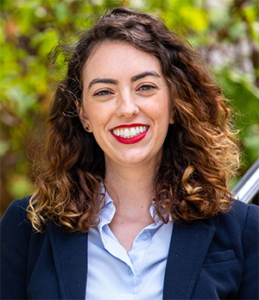 Rachel Ellis is an Assistant Professor of Criminology and Criminal Justice at the University of Maryland. Her research focuses on women’s experiences of punishment in the United States. Using qualitative methods – especially ethnography and interviews – Dr. Ellis investigates incarceration and inequality related to race/class/gender, sexuality, and religion. Her first, sole-authored book, In This Place Called Prison: Women’s Religious Life in the Shadow of Punishment, examines the contours of freedom and constraint offered by religion within an institution designed to punish (University of California Press, 2023). Dr. Ellis’ articles can be found in outlets such as Criminology, the British Journal of Criminology, Justice Quarterly, Theory & Society, and Sociological Methods & Research. Her research has received recognition and awards from the American Sociological Association, the American Society of Criminology, and the Society for the Scientific Study of Religion. Her work has been supported by grants and fellowships from the American Council of Learned Societies, the Association for the Sociology of Religion, the Institute for Humane Studies at George Mason University, the Louisville Institute, the National Science Foundation, the Religious Research Association, the Russell Sage Foundation, the University of Missouri, the University of Pennsylvania, the University of Maryland, and the Woodrow Wilson National Fellowship Foundation. Her latest projects include an interview study of women’s reentry and a Russell Sage-funded study of women’s experiences on probation.
Rachel Ellis is an Assistant Professor of Criminology and Criminal Justice at the University of Maryland. Her research focuses on women’s experiences of punishment in the United States. Using qualitative methods – especially ethnography and interviews – Dr. Ellis investigates incarceration and inequality related to race/class/gender, sexuality, and religion. Her first, sole-authored book, In This Place Called Prison: Women’s Religious Life in the Shadow of Punishment, examines the contours of freedom and constraint offered by religion within an institution designed to punish (University of California Press, 2023). Dr. Ellis’ articles can be found in outlets such as Criminology, the British Journal of Criminology, Justice Quarterly, Theory & Society, and Sociological Methods & Research. Her research has received recognition and awards from the American Sociological Association, the American Society of Criminology, and the Society for the Scientific Study of Religion. Her work has been supported by grants and fellowships from the American Council of Learned Societies, the Association for the Sociology of Religion, the Institute for Humane Studies at George Mason University, the Louisville Institute, the National Science Foundation, the Religious Research Association, the Russell Sage Foundation, the University of Missouri, the University of Pennsylvania, the University of Maryland, and the Woodrow Wilson National Fellowship Foundation. Her latest projects include an interview study of women’s reentry and a Russell Sage-funded study of women’s experiences on probation.
MENTOR AWARD RECIPIENTS
The Mentor Award is designed to recognize excellence in mentorship in the discipline of Criminology and Criminal Justice. (Establish in 1995 by the Mentoring Committee; Adopted as a society-wide award in 2014)
1995: Christine Sellers, University of South Florida
1996: no award given
1997: Pamela Irving Jackson, Rhode Island College
1998: Hal Pepinsky, Indiana University
1999: Jim Thomas, University of Northern Illinois
2000: Mathieu Deflem, University of South Carolina
2001: Jeffrey Walker, University of Arkansas, Little Rock
2002: no award given
2003: no award given
2004: no award given
2005: Alex Piquero, University of Florida
2006: no award given
2007: no award given
2008: no award given
2009: no award given
2010: no award given
2011: Jon Shane, John Jay College of Criminal Justice, CUNY
2012: no award given
2013: no award given
2014: Amy Farrell, Northeastern University
2015: Jody Miller, Rutgers University
2016: David Weisburd, George Mason University
2017: Merry Morash, Michigan State University
2018: Francis T. Cullen, University of Cincinnati
2019: Elliott Currie, University of California, Irvine
2020: Bill McCarthy, Rutgers University
 Allison D. Redlich is a Professor of Criminology, Law and Society at George Mason University, where she also serves as Associate Chair and Director of Graduate Programs. After receiving her PhD in Developmental Psychology from the University of California, Davis, she completed a postdoctoral fellowship at Stanford University School of Medicine. Dr. Redlich has received approximately five million dollars from federal grant agencies and private foundations to conduct her research on police interrogation, guilty pleas, wrongful convictions, and mental health courts. Across these areas, she has published extensively, most often with the students she mentors. Her most recent books, both published in 2019, include, Wrongful convictions: Law, social science, and policy (2nd edition; co-authored with Acker), and A system of pleas: Social science’s contribution to the real legal system (co-edited with Edkins). Redlich is commonly asked to educate legal professionals and the public in the form of expert testimony and presentations, currently sits on the editorial boards of five academic journals, and is the Immediate Past President of the American Psychology-Law Society. Redlich is a Fellow of the Academy of Experimental Criminology and winner of the American Psychological Association Mid-Career Award for Outstanding Contributions to Benefit Children, Youth, and Families. Having been fortunate to have received excellent mentorship throughout her career, she is honored to receive the ASC Mentoring Award.
Allison D. Redlich is a Professor of Criminology, Law and Society at George Mason University, where she also serves as Associate Chair and Director of Graduate Programs. After receiving her PhD in Developmental Psychology from the University of California, Davis, she completed a postdoctoral fellowship at Stanford University School of Medicine. Dr. Redlich has received approximately five million dollars from federal grant agencies and private foundations to conduct her research on police interrogation, guilty pleas, wrongful convictions, and mental health courts. Across these areas, she has published extensively, most often with the students she mentors. Her most recent books, both published in 2019, include, Wrongful convictions: Law, social science, and policy (2nd edition; co-authored with Acker), and A system of pleas: Social science’s contribution to the real legal system (co-edited with Edkins). Redlich is commonly asked to educate legal professionals and the public in the form of expert testimony and presentations, currently sits on the editorial boards of five academic journals, and is the Immediate Past President of the American Psychology-Law Society. Redlich is a Fellow of the Academy of Experimental Criminology and winner of the American Psychological Association Mid-Career Award for Outstanding Contributions to Benefit Children, Youth, and Families. Having been fortunate to have received excellent mentorship throughout her career, she is honored to receive the ASC Mentoring Award.
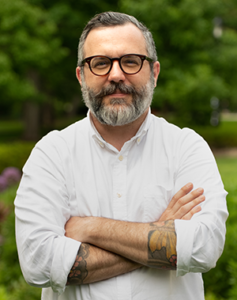 Andrew V. Papachristos is a Professor of Sociology and Faculty Fellow at the Institute for Policy Research at Northwestern University. He is also the founder and Faculty Director of the Northwestern Neighborhood & Network Initiative. Papachristos’ research aims to understand how the connected nature of cities—how their citizens, neighborhoods, and institutions are tied to one another—affect what we feel, think, and do. His main research applies network science to the study of gun violence, police misconduct, illegal gun markets, Al Capone, street gangs, and urban neighborhoods. He is also currently completing a book that examines the role street gangs have played in building The Great American City. Papachristos is a Chicago native and earned his PhD from the University of Chicago.
Andrew V. Papachristos is a Professor of Sociology and Faculty Fellow at the Institute for Policy Research at Northwestern University. He is also the founder and Faculty Director of the Northwestern Neighborhood & Network Initiative. Papachristos’ research aims to understand how the connected nature of cities—how their citizens, neighborhoods, and institutions are tied to one another—affect what we feel, think, and do. His main research applies network science to the study of gun violence, police misconduct, illegal gun markets, Al Capone, street gangs, and urban neighborhoods. He is also currently completing a book that examines the role street gangs have played in building The Great American City. Papachristos is a Chicago native and earned his PhD from the University of Chicago.
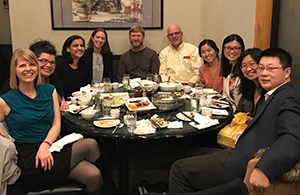 The picture is of alumni from Bushway’s lab together for dinner at ASC 2017 in Philly.
The picture is of alumni from Bushway’s lab together for dinner at ASC 2017 in Philly.
Pictured from left to right: Audrey Hickert (University of Cincinnati); Sarah Tahamont (University of Maryland); Garima Siwach (American Institutes for Research); Megan Denver (Northeastern University); Gary Sweeten (Arizona State University); Shawn Bushway (University at Albany); Jaeok Kim (Vera Institute); Siyu Liu (Penn State, Harrisburg); Rufan Luo (Arizona State University); Shi Yan (Arizona State University). Not quite yet in the picture – Yinzhi Shen (University at Albany).
Shawn would like to thank all the colleagues with whom he has had the privilege of working over the years. He would also like to thank Daniel Nagin, Raymond Paternoster and Peter Reuter for teaching him what true servant mentorship looks like. Dan makes it a top priority to provide near instantaneous feedback on student work, recognizing that feedback is a key element of learning. Ray lived the importance of having fun (and food) with the Paternoster Mafia. Peter has demonstrated through his consistent covid commitment to regular “virtual walks” the importance of staying connected as friends first. https://www.albany.edu/rockefeller/faculty/shawn-bushway
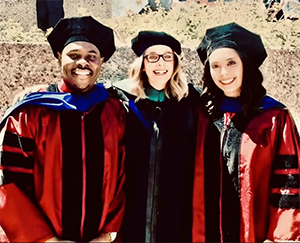 Kristy Holtfreter is a Professor in the School of Criminology and Criminal Justice (SCCJ) at Arizona State University and is also affiliated with the Center for Innovation in Healthy and Resilient Aging. She received her Ph.D. and M.S. degrees from Michigan State University and her B.A. from the University of Washington. Her professional interests include actuarial risk assessment, criminological theory, organizational psychology, and white-collar crime. Additionally, she is an amateur baseball historian and genetic genealogist.
Kristy Holtfreter is a Professor in the School of Criminology and Criminal Justice (SCCJ) at Arizona State University and is also affiliated with the Center for Innovation in Healthy and Resilient Aging. She received her Ph.D. and M.S. degrees from Michigan State University and her B.A. from the University of Washington. Her professional interests include actuarial risk assessment, criminological theory, organizational psychology, and white-collar crime. Additionally, she is an amateur baseball historian and genetic genealogist.
Dr. Holtfreter’s research has received funding from prestigious agencies and other notable organizations, including the United States Department of Health and Human Services, the National Institute of Justice, and the AARP. From 2010 to 2018, she served as an administrator in the SCCJ graduate program, where she pioneered numerous curricular advancements. As a Dean’s Fellow in ASU’s Graduate College (2020-2022), she initiated research integrity programming, and advised the Faculty Senate Research and Creative Activities Subcommittee on procedures for handling illegally obtained data.
Beyond ASU, Dr. Holtfreter has been instrumental in facilitating student professional development, notably as a founding member and first Chair of ASC’s Division of White-Collar and Corporate Crime. Her professional service includes appointments on the National Crime Victimization Survey redesign team, the Stanford University Financial Fraud Workgroup, and a National Academy of Sciences panel on corporate criminal justice reform.
Dr. Holtfreter credits her dissertation advisor, Dr. Merry Morash, for being an exemplary mentor in research, teaching, and service, which profoundly influenced her own commitment to supporting the next generation of criminologists.
Note: Pictured with Dr. Holtfreter are ASU alums Dr. D’Andre Walker (University of Mississippi) and Dr. Katelyn Golladay (University of Wyoming).
JOAN PETERSILIA OUTSTANDING ARTICLE AWARD RECIPIENTS
The Joan Petersilia Outstanding Article Award honors exceptional contributions made by scholars in article form. The award is given annually for the peer-reviewed article that makes the most outstanding contribution to research in criminology.
2008: Ross L. Matsueda, Derek A. Kreager, & David Huizinga, “Deterring delinquents: A rational choice model of theft and violence,” American Sociological Review, 71(1): 95-122, 2006.
2009: Ted Chiricos, Kelle Barrick, William Bales & Stephanie Bontrager, “The labeling of convicted felons and its consequences for recidivism,” Criminology, 45 (3): 547-582, 2007.
2010: Bill McCarthy and Teresa Casey, “Love, sex, and crime: Adolescent romantic relationships and offending,” American Sociological Review, 73 (6): 944-969, 2008.
2011: William Spelman, “Crime, cash and limited options: Explaining the prison boom,” Criminology & Public Policy, 8 (1): 29-77, 2009.
2012:
2013: Ronald L. Simons, Man Kit Lei, Steven R. H. Beach, Gene H. Brody, Robert A. Philibert, & Frederick X. Gibbons, “Social Environment, Genes, and Aggression: Evidence Supporting the Differential Susceptibility Perspective.” American Sociological Review, 76: 883-912, 2011.
2014: Chang Min Na & Raymond Paternoster, “Can Self Control Change Substantially Over Time? Rethinking the Relationship Between Self- and Social Control.” Criminology, 50 (2): 427-462, 2012.
2015: Issa Kohler-Hausmann, “Misdemeanor Justice: Control without Conviction.” American Journal of Sociology, 119 (2): 351-393, 2013.
2016: Sarah Brayne, “Surveillance and System Avoidance: Criminal Justice Contact and Institutional Attachment.” American Sociological Review, 79(3):367-391, 2014.
2017: Michael Campbell, Matt Vogel, & Joshua Williams, “Historical Contingencies and the Evolving Importance of Race, Violent Crime, and Region in Explaining Mass Incarceration in the United States,” Criminology, 53: 180 – 203, 2015.
2018: Michael Walker, “Race Making in a Penal Institution,” American Journal of Sociology, Vol 121(4), pp. 1051-1078.
2019: Darrell Steffensmeier, Hua (Sara) Zhong & Yunmei Lu, “Age and its Relation to Crime in Taiwan and the United States: Invariant, or Does Cultural Context Matter.” Criminology, Vol 55 (2): 377-404, 2017.
2020: Brenden Beck & Adam Goldstein, “Governing through police? Housing market reliance, welfare retrenchment, and police budgeting in an era of declining crime.” Social Forces, (96)3: 1183-1210.
 Chris Herring is an Assistant Professor of Sociology at the University of California Los Angeles, and current Postdoctoral Fellow at Harvard University’s Inequality in America Initiative. His research focuses on homelessness, housing, welfare, and criminal justice in US cities. Chris’ work has been published in American Sociological Review, the Annals of the American Academy of Political and Social Sciences, Social Problems, City and Community, City, and numerous edited volumes. Chris’ forthcoming book, Cruel Streets, explains how San Francisco, a city at the vanguard of progressive urban politics, intensified punishment towards the unhoused amidst initiatives of criminal justice reform and shelter expansion. He is also working on a study with Professor Sandra Susan Smith on the impacts of Fair Chance policies like Ban the Box on the perceptions and experiences of the formerly incarcerated. Chris works regularly with civil rights lawyers, policymakers, and community organizers addressing the criminalization of homelessness across the country. Most recently he has drawn on his research featured in the article receiving the award in collaboration with the San Francisco Coalition on Homelessness, community partners, district supervisors, police commissioners, and the city’s Department of Emergency Management on a plan for a Compassionate Alternative Response Team (CART), as an alternative to a police response to homelessness in San Francisco.
Chris Herring is an Assistant Professor of Sociology at the University of California Los Angeles, and current Postdoctoral Fellow at Harvard University’s Inequality in America Initiative. His research focuses on homelessness, housing, welfare, and criminal justice in US cities. Chris’ work has been published in American Sociological Review, the Annals of the American Academy of Political and Social Sciences, Social Problems, City and Community, City, and numerous edited volumes. Chris’ forthcoming book, Cruel Streets, explains how San Francisco, a city at the vanguard of progressive urban politics, intensified punishment towards the unhoused amidst initiatives of criminal justice reform and shelter expansion. He is also working on a study with Professor Sandra Susan Smith on the impacts of Fair Chance policies like Ban the Box on the perceptions and experiences of the formerly incarcerated. Chris works regularly with civil rights lawyers, policymakers, and community organizers addressing the criminalization of homelessness across the country. Most recently he has drawn on his research featured in the article receiving the award in collaboration with the San Francisco Coalition on Homelessness, community partners, district supervisors, police commissioners, and the city’s Department of Emergency Management on a plan for a Compassionate Alternative Response Team (CART), as an alternative to a police response to homelessness in San Francisco.
————————————————————————
 Tony Cheng is an Assistant Professor of Criminology, Law & Society and Sociology (by courtesy) at the University of California, Irvine. He is interested in how strategies of state legitimation shape urban inequality in America. His book “The Policing Machine: Enforcement, Endorsements, and the Illusion of Public Input” (under full contract, University of Chicago Press) argues that police are legitimacy optimizers—not maximizers—who may want public legitimacy, but not at the expense of organizational independence. It shows how America’s largest police force pursues these goals by cultivating political capital through a strategic politics of distributing public resources, regulatory leniency, and coercive force. His research has appeared in the American Journal of Sociology, Criminology, Social Problems, Law & Society Review, and Criminology & Public Policy. He earned a Sociology PhD from Yale University in 2021 and a JD from NYU Law School in 2018.
Tony Cheng is an Assistant Professor of Criminology, Law & Society and Sociology (by courtesy) at the University of California, Irvine. He is interested in how strategies of state legitimation shape urban inequality in America. His book “The Policing Machine: Enforcement, Endorsements, and the Illusion of Public Input” (under full contract, University of Chicago Press) argues that police are legitimacy optimizers—not maximizers—who may want public legitimacy, but not at the expense of organizational independence. It shows how America’s largest police force pursues these goals by cultivating political capital through a strategic politics of distributing public resources, regulatory leniency, and coercive force. His research has appeared in the American Journal of Sociology, Criminology, Social Problems, Law & Society Review, and Criminology & Public Policy. He earned a Sociology PhD from Yale University in 2021 and a JD from NYU Law School in 2018.
————————————————————————
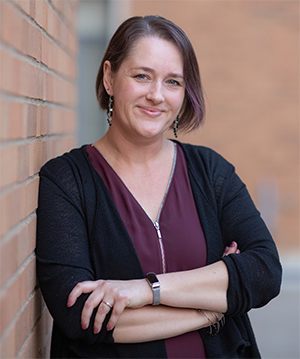 Michelle S. Phelps is Associate Professor of Sociology at the University of Minnesota (Twin Cities). She is the co-author of Breaking the Pendulum: The Long Struggle Over Criminal Justice. Her work on mass probation, policing, and prisons and penal transformation has been published in leading disciplinary and interdisciplinary journals, including Law & Society Review, Social Problems, and Sociology of Race and Ethnicity.
Michelle S. Phelps is Associate Professor of Sociology at the University of Minnesota (Twin Cities). She is the co-author of Breaking the Pendulum: The Long Struggle Over Criminal Justice. Her work on mass probation, policing, and prisons and penal transformation has been published in leading disciplinary and interdisciplinary journals, including Law & Society Review, Social Problems, and Sociology of Race and Ethnicity.
 Christopher E. Robertson is a Ph.D. Candidate in Sociology at the University of Minnesota (Twin Cities), a Minnesota Population Center population science graduate trainee, and a Robert Wood Johnson Foundation Health Policy Research Scholar. His research examines how
Christopher E. Robertson is a Ph.D. Candidate in Sociology at the University of Minnesota (Twin Cities), a Minnesota Population Center population science graduate trainee, and a Robert Wood Johnson Foundation Health Policy Research Scholar. His research examines how
historic spatial racism influences
police-community relations and population health.
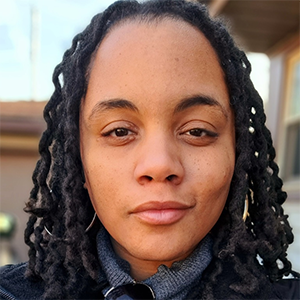 Amber Joy Powell is Assistant Professor of Sociology and Criminology at the University of Iowa. Her research examines the intersections of gendered racialized violence, law, and the carceral state and has been published in Law & Society Review and Gender & Society. More recent work explores the sexual victimization of incarcerated youth, prison rape reform, and the fight for sexual safety among legal practitioners and anti-prison rape activists.
Amber Joy Powell is Assistant Professor of Sociology and Criminology at the University of Iowa. Her research examines the intersections of gendered racialized violence, law, and the carceral state and has been published in Law & Society Review and Gender & Society. More recent work explores the sexual victimization of incarcerated youth, prison rape reform, and the fight for sexual safety among legal practitioners and anti-prison rape activists.
————————————————————————
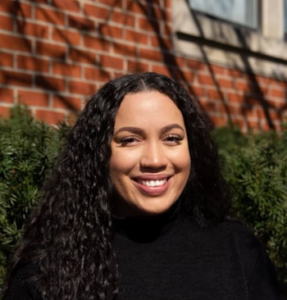 Dr. Sadé Lindsay is an Assistant Professor of Public Policy and Sociology at Cornell University, a W.E.B. Du Bois Fellow of the National Institute of Justice, and a Health Equity Scholar of the Robert Wood Johnson Foundation and the Scholar Strategy Network. Her research interests lie at the intersection of criminal justice policy, punishment, and racial inequality. She examines how criminal justice policy and practice, such as state collateral sanctions, drug laws, and prison education programs, impact individual life chances, social mobility, and overall well-being across racial groups. Her research has been published in journals such as Criminology, Journal of Marriage and Family, Population Research and Policy Review, Journal of Research in Crime and Delinquency, and Social Problems. She has also received numerous awards for her scholarship, including from the American Society of Criminology, the American Sociological Association, and the Society for the Study of Social Problems, and her research has been funded by the National Science Foundation, Russell Sage Foundation, Robert Wood Johnson Foundation, the National Institute of Justice, and the Center for Engaged Scholarship. She is a proud three-time graduate of The Ohio State University.
Dr. Sadé Lindsay is an Assistant Professor of Public Policy and Sociology at Cornell University, a W.E.B. Du Bois Fellow of the National Institute of Justice, and a Health Equity Scholar of the Robert Wood Johnson Foundation and the Scholar Strategy Network. Her research interests lie at the intersection of criminal justice policy, punishment, and racial inequality. She examines how criminal justice policy and practice, such as state collateral sanctions, drug laws, and prison education programs, impact individual life chances, social mobility, and overall well-being across racial groups. Her research has been published in journals such as Criminology, Journal of Marriage and Family, Population Research and Policy Review, Journal of Research in Crime and Delinquency, and Social Problems. She has also received numerous awards for her scholarship, including from the American Society of Criminology, the American Sociological Association, and the Society for the Study of Social Problems, and her research has been funded by the National Science Foundation, Russell Sage Foundation, Robert Wood Johnson Foundation, the National Institute of Justice, and the Center for Engaged Scholarship. She is a proud three-time graduate of The Ohio State University.
RUTH D. PETERSON FELLOWSHIPS FOR RACIAL AND ETHNIC DIVERSITY RECIPIENTS
The Ruth D. Peterson Fellowship for Racial and Ethnic Diversity is designed to encourage students of color, especially those from racial and ethnic groups underrepresented in the field, to enter the field of criminology and criminal justice, and to facilitate the completion of their degrees. (formerly known as GRADUATE FELLOWSHIPS FOR ETHNIC MINORITIES)
1989: Zina McGee, Tulane University
1990: Sandra Lee Browning, University of Cincinnati
1991: Tonya Y. Williams, University of Delaware
1992:
1993: Angela M. Moore, University of Maryland
1994: Lisa Sanchez, University of California, Irvine
1995:
1996:
1997:
1998:
1999:
2000:
2001:
2002:
2003:
2004:
2005:
2006:
2007:
2008
2009:
2010:
2011:
2012:
2013:
2014:
2015:
2016:
2017:
2018:
2019:
2020:

Popy Begum is a doctoral student at the School of Criminal Justice at Rutgers University-Newark. She graduated from John Jay College of Criminal Justice with a B.A. in International Criminal Justice and Certificate in Dispute Resolution. Popy earned the MSc in Criminology and Criminal Justice (Research Methods) from the Centre for Criminology, Oxford University in England. Among Popy’s broad interests are (1) intersectionality of race/ethnicity, gender, and religion; (2) the comparative role of crime and justice phenomena across multiple societies (e.g., South Asia, West Africa, the Balkans, the United States and the United Kingdom); and (3) qualitative methods. She has explored the experiences of victims and survivors in forced marriages in the United Kingdom and United States, the role of West African and Balkan women in human trafficking networks, and most recently, for her dissertation, she conducted a mixed-methods study of Muslim and Hindu sex workers in New Delhi, India using participant observations and 102 in-depth interviews via Respondent-driven Sampling.
Popy has won dozens of awards for excellence in research, teaching, mentoring and service. Her research has been supported and recognized by organizations locally and internationally, including the Howard League for Penal Reform, the American Society of Criminology, the Society for the Study of Social Problems, the Association of Doctoral Programs in Criminology and Criminal Justice, the Association for the Sociology of Religion, the Religious Research Association, and the Society for the Scientific Study of Religion. Popy’s work has appeared in peer-reviewed journals, including Trends in Organized Crime, Social Policy and Society, and edited volumes published by Oxford and Cambridge University Presses.
_____________________ *** _____________________
 Alondra D. Garza, M.A. is a doctoral candidate in the Department of Criminal Justice and Criminology at Sam Houston State University (SHSU). Her research focuses on victimology, specifically the criminal legal response to violence against women with attention to how the social stratification of victims (e.g., gender, race and ethnicity, sexual orientation, legal status, etc.) influences responses, treatment, and decision-making. Her recent scholarly work has appeared in a variety of mainstream and specialty journals including Crime & Delinquency, Criminal Justice and Behavior, Policing: An International Journal, and Violence Against Women, and Journal of Interpersonal Violence, among others. Alondra has been recognized University-wide by SHSU and received the Outstanding Master’s Thesis award. Most recently, she was selected as the 2020 recipient of the Graduate Scholar Award from the Division of Women & Crime of the American Society of Criminology and as the recipient of the 2020 Outstanding Graduate Student Award from the Victimology Section of the Academy of Criminal Justice Sciences.
Alondra D. Garza, M.A. is a doctoral candidate in the Department of Criminal Justice and Criminology at Sam Houston State University (SHSU). Her research focuses on victimology, specifically the criminal legal response to violence against women with attention to how the social stratification of victims (e.g., gender, race and ethnicity, sexual orientation, legal status, etc.) influences responses, treatment, and decision-making. Her recent scholarly work has appeared in a variety of mainstream and specialty journals including Crime & Delinquency, Criminal Justice and Behavior, Policing: An International Journal, and Violence Against Women, and Journal of Interpersonal Violence, among others. Alondra has been recognized University-wide by SHSU and received the Outstanding Master’s Thesis award. Most recently, she was selected as the 2020 recipient of the Graduate Scholar Award from the Division of Women & Crime of the American Society of Criminology and as the recipient of the 2020 Outstanding Graduate Student Award from the Victimology Section of the Academy of Criminal Justice Sciences.
_____________________ *** _____________________
 Maria Valdovinos Olson is a doctoral candidate in public sociology at George Mason University and a member of the Movement Engaged Research Hub at the Center for Social Science Research. Her research interests include policing, prisoner reentry, and evidence-based policy. Maria’s dissertation comprises a series of essays on criminal legal reform and prisoner reentry in the era of decarceration and movement toward abolition. She is currently collecting data in support of an essay addressing the question of how existing and envisioned social systems and social policies might organize the provision of care for the formerly incarcerated under a larger paradigmatic shift from punishment-oriented responses to care-oriented ones. Other interests span into issues of safety, health, and wellness associated with the criminal legal system, focusing on both practitioners and individuals who have had direct system involvement. Recent work has been published in Women & Criminal Justice, Policing: An International Journal of Police Strategies & Management and is forthcoming in the Journal of Offender Rehabilitation. Maria has been recognized as a Stanford Lyman Scholar (MSSA), Ruth D. Peterson Fellow (ASC), and Dean’s Challenge Scholar (Mason).
Maria Valdovinos Olson is a doctoral candidate in public sociology at George Mason University and a member of the Movement Engaged Research Hub at the Center for Social Science Research. Her research interests include policing, prisoner reentry, and evidence-based policy. Maria’s dissertation comprises a series of essays on criminal legal reform and prisoner reentry in the era of decarceration and movement toward abolition. She is currently collecting data in support of an essay addressing the question of how existing and envisioned social systems and social policies might organize the provision of care for the formerly incarcerated under a larger paradigmatic shift from punishment-oriented responses to care-oriented ones. Other interests span into issues of safety, health, and wellness associated with the criminal legal system, focusing on both practitioners and individuals who have had direct system involvement. Recent work has been published in Women & Criminal Justice, Policing: An International Journal of Police Strategies & Management and is forthcoming in the Journal of Offender Rehabilitation. Maria has been recognized as a Stanford Lyman Scholar (MSSA), Ruth D. Peterson Fellow (ASC), and Dean’s Challenge Scholar (Mason).
 Faith M. Deckard is a Ph.D. candidate in the Department of Sociology at the University of Texas at Austin. Her research examines marginalized communities’ collective experiences, felt consequences, and strategies around social ills like criminal-legal contact, debt, and discrimination. In her dissertation specifically, she utilizes ethnographic observation within 3 commercial bail bond agencies and in-depth interviews with bail agents, defendants, and co-signers to explore how the expansion of risk assessment and entanglement of families alter the experience of legal debt and punishment. Some of her previous work appears in Social Problems, Annual Review of Sociology, and Race and Social Problems. In addition to the American Society of Criminology, her research has been supported by the National Science Foundation, National Institute of Child Health and Human Development, and Russell Sage Foundation. Beyond research, Faith derives joy from teaching students behind bars through the Texas Prison Education Initiative (TPEI).
Faith M. Deckard is a Ph.D. candidate in the Department of Sociology at the University of Texas at Austin. Her research examines marginalized communities’ collective experiences, felt consequences, and strategies around social ills like criminal-legal contact, debt, and discrimination. In her dissertation specifically, she utilizes ethnographic observation within 3 commercial bail bond agencies and in-depth interviews with bail agents, defendants, and co-signers to explore how the expansion of risk assessment and entanglement of families alter the experience of legal debt and punishment. Some of her previous work appears in Social Problems, Annual Review of Sociology, and Race and Social Problems. In addition to the American Society of Criminology, her research has been supported by the National Science Foundation, National Institute of Child Health and Human Development, and Russell Sage Foundation. Beyond research, Faith derives joy from teaching students behind bars through the Texas Prison Education Initiative (TPEI).
_____________________ *** _____________________
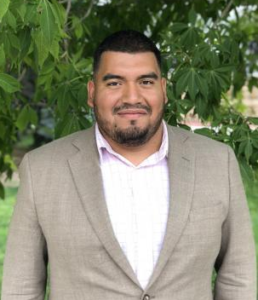 Jose Antonio Sanchez is a doctoral candidate and graduate research/teaching assistant at the University of Colorado Boulder in the Sociology department and a graduate affiliate at the Institute of Behavioral Science in the Prevention Science Program. Jose received his B.S. and M.S. from California State University, Los Angeles. His research interests are gangs and criminal networks, program evaluation, and criminological theory. He is currently working as a graduate research assistant for a National Institute of Justice (NIJ) funded randomized control trial evaluation of the Gang Reduction Initiative of Denver (GRID). Jose’s dissertation focuses on gang intervention by street outreach workers in Denver. Specifically, he is focusing on how the outreach workers for the GRID program internalize and conceptualize gang intervention, the program model, and the influence it has on service delivery. In addition to his work at the University of Colorado Boulder, he has been a research assistant with the Emergency Preparedness Research, Evaluation, & Practice (EPREP) Program at the Harvard T.H. Chan School of Public Health. Prior to attending CU Boulder, he worked as a research assistant for the Los Angeles Mayors’ Office of Gang Reduction and Youth Development (GRYD). Jose’s research has been published in Homicide Studies, Journal of Interpersonal Violence, and Justice Evaluation Journal.
Jose Antonio Sanchez is a doctoral candidate and graduate research/teaching assistant at the University of Colorado Boulder in the Sociology department and a graduate affiliate at the Institute of Behavioral Science in the Prevention Science Program. Jose received his B.S. and M.S. from California State University, Los Angeles. His research interests are gangs and criminal networks, program evaluation, and criminological theory. He is currently working as a graduate research assistant for a National Institute of Justice (NIJ) funded randomized control trial evaluation of the Gang Reduction Initiative of Denver (GRID). Jose’s dissertation focuses on gang intervention by street outreach workers in Denver. Specifically, he is focusing on how the outreach workers for the GRID program internalize and conceptualize gang intervention, the program model, and the influence it has on service delivery. In addition to his work at the University of Colorado Boulder, he has been a research assistant with the Emergency Preparedness Research, Evaluation, & Practice (EPREP) Program at the Harvard T.H. Chan School of Public Health. Prior to attending CU Boulder, he worked as a research assistant for the Los Angeles Mayors’ Office of Gang Reduction and Youth Development (GRYD). Jose’s research has been published in Homicide Studies, Journal of Interpersonal Violence, and Justice Evaluation Journal.
_____________________ *** _____________________
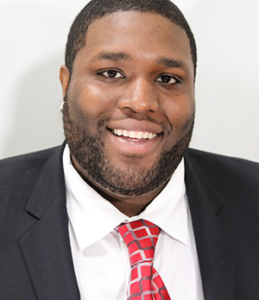 A Native of the Bronx Durrell Malik Washington Sr. is an Abolitionist Social Worker and Ph.D. Candidate at the University of Chicago in the school of social work. His scholarship of focus lies at the intersections of Abolition, Juvenile Legal Law and Policy, Families and Networks. His dissertation study focuses on the impact of youth incarceration on Black families across the United States, specifically through the lens of siblings of formerly incarcerated young people. Durrell teaches courses related to Abolition, The Social Meaning of Race, Race Crime and Justice, and Human Behavior in the Social Environment. Durrell received his Master’s Degree in Social Work from Columbia University in 2018.
A Native of the Bronx Durrell Malik Washington Sr. is an Abolitionist Social Worker and Ph.D. Candidate at the University of Chicago in the school of social work. His scholarship of focus lies at the intersections of Abolition, Juvenile Legal Law and Policy, Families and Networks. His dissertation study focuses on the impact of youth incarceration on Black families across the United States, specifically through the lens of siblings of formerly incarcerated young people. Durrell teaches courses related to Abolition, The Social Meaning of Race, Race Crime and Justice, and Human Behavior in the Social Environment. Durrell received his Master’s Degree in Social Work from Columbia University in 2018.
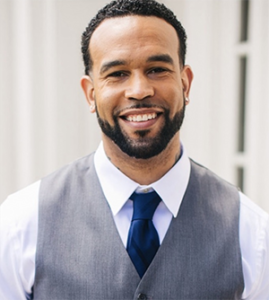 CJ Appleton is a doctoral student in the Criminology, Law, and Society department at George Mason University. He currently works as a Graduate Research Assistant at the Center for Advancing Correctional Excellence! (ACE!) under the direction of Dr. Faye S. Taxman. CJ’s research is centered around race, gender, identity, criminal justice systems behavior, and organizational theory. CJ’s dissertation work is a replication and expansion of Dr. Maruna’s Liverpool Desistance Study. It aims to develop a synergy between a critical race approach and a general theory of desistance to examine the role of race in the development of desistance narratives. Beyond that, CJ’s work on criminal justice reform has focused on community supervision. Specifically, his work focuses on officer-client relationships, supervision conditions, using a humanistic approach in supervision practice, and improving implementation of evidence-based reforms within organizations.
CJ Appleton is a doctoral student in the Criminology, Law, and Society department at George Mason University. He currently works as a Graduate Research Assistant at the Center for Advancing Correctional Excellence! (ACE!) under the direction of Dr. Faye S. Taxman. CJ’s research is centered around race, gender, identity, criminal justice systems behavior, and organizational theory. CJ’s dissertation work is a replication and expansion of Dr. Maruna’s Liverpool Desistance Study. It aims to develop a synergy between a critical race approach and a general theory of desistance to examine the role of race in the development of desistance narratives. Beyond that, CJ’s work on criminal justice reform has focused on community supervision. Specifically, his work focuses on officer-client relationships, supervision conditions, using a humanistic approach in supervision practice, and improving implementation of evidence-based reforms within organizations.
_____________________ *** _____________________
 Vanessa Centelles, MA, is a doctoral candidate in the Department of Criminology at the University of South Florida (USF). Her research uses an interdisciplinary approach and intersectional framework to explore how sociocultural factors influence criminal behaviors, victimization experiences, and perceptions of crime. Her work largely centers around marginalized and minoritized adult persons, with a focus on individuals who identify as Hispanic and Latino/x/e. She has experience with an array of methodologies and analytical strategies such as secondary data analysis, content analysis, quasi-experimental design, regression techniques, and structural equation modeling. Notably, her expertise and passion lie in survey methodology and primary data collection. For example, her dissertation uses primary survey data to examine (1) how processes such as acculturation and discrimination relate to intimate partner violence (IPV) victimization experiences and definitions of IPV, (2) the (in)variance of these processes by race and generational status, and (3) the role of resiliency in moderating these relationships. Her published scholarship has appeared in highly recognized and specialized journals including American Journal of Criminal Justice, Criminal Justice and Behavior, and Social Media + Society, among other outlets. In addition to being recognized as a Ruth D. Peterson Fellow by the American Society of Criminology, Vanessa has been recognized by USF as a Graduate Success Fellow, Latino Graduate Success Fellow, and Scott F. Allen Outstanding Ambassador.
Vanessa Centelles, MA, is a doctoral candidate in the Department of Criminology at the University of South Florida (USF). Her research uses an interdisciplinary approach and intersectional framework to explore how sociocultural factors influence criminal behaviors, victimization experiences, and perceptions of crime. Her work largely centers around marginalized and minoritized adult persons, with a focus on individuals who identify as Hispanic and Latino/x/e. She has experience with an array of methodologies and analytical strategies such as secondary data analysis, content analysis, quasi-experimental design, regression techniques, and structural equation modeling. Notably, her expertise and passion lie in survey methodology and primary data collection. For example, her dissertation uses primary survey data to examine (1) how processes such as acculturation and discrimination relate to intimate partner violence (IPV) victimization experiences and definitions of IPV, (2) the (in)variance of these processes by race and generational status, and (3) the role of resiliency in moderating these relationships. Her published scholarship has appeared in highly recognized and specialized journals including American Journal of Criminal Justice, Criminal Justice and Behavior, and Social Media + Society, among other outlets. In addition to being recognized as a Ruth D. Peterson Fellow by the American Society of Criminology, Vanessa has been recognized by USF as a Graduate Success Fellow, Latino Graduate Success Fellow, and Scott F. Allen Outstanding Ambassador.
_____________________ *** _____________________
 Sheena L. Gilbert (ABD), is a Ph.D. student in the School of Criminology and Criminal Justice (SCCJ) at the University of Nebraska at Omaha (UNO). She is also a citizen of the Stockbridge-Munsee Tribe and identifies as an Indigenous criminologist. Her research focuses on, gender-based violence, Indigenous crime & victimization, including Missing or Murdered Indigenous Persons (MMIP), victimization in underserved populations, campus/university sexual violence, and policy reform and Indigenous persons (e.g., VAWA). In addition, she currently serves as a member of the Nebraska Tribes Addressing Violence (NETAV) Coalition.
Sheena L. Gilbert (ABD), is a Ph.D. student in the School of Criminology and Criminal Justice (SCCJ) at the University of Nebraska at Omaha (UNO). She is also a citizen of the Stockbridge-Munsee Tribe and identifies as an Indigenous criminologist. Her research focuses on, gender-based violence, Indigenous crime & victimization, including Missing or Murdered Indigenous Persons (MMIP), victimization in underserved populations, campus/university sexual violence, and policy reform and Indigenous persons (e.g., VAWA). In addition, she currently serves as a member of the Nebraska Tribes Addressing Violence (NETAV) Coalition.
Her publications include works that examined personal victimization in Native communities using two models of social disorganization theory (traditional and Indigenized) (Crime & Delinquency), the role of victim advocates in missing Native person cases (Journal of Interpersonal Violence), how the Violence Against Women Act (VAWA) fails to protect Indigenous Women (Feminist Criminology), assessing the scope of missing Native Americans in Nebraska (Race and Justice), and the victimization of Indigenous LGBTQIA2S persons (book chapter in Queer Victimology: Understanding the Victim Experience).
Her current grant works includes NIJ-funded grants to create a tribal-centered campus climate assessment (CCA) for tribal colleges/universities (TCUs) and replicating the “Nebraska Model” of missing Native persons to examine the scope of MMIP in New Mexico. Other grant work includes evaluating a newly created bystander basics training, the Minnesota sexual assault kit initiative (SAKI), and examining the scope of missing Native American persons in Nebraska.
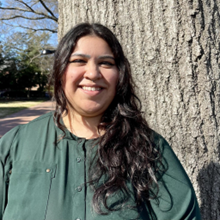 Susana Avalos, M.A.S., is a doctoral candidate and instructor in the Department of Sociology and Criminal Justice at Old Dominion University (ODU). Susana researches transgender people’s social, criminal legal, and online experiences and is interested in how they navigate safety, resist victimization, and the role of community support in overcoming trauma. Susana’s dissertation is an extensive and intersectional examination of the relationship between safety, place, and space in the lives of transgender individuals. Their recent scholarly work has appeared in a variety of journals including Crime & Delinquency, Homicide Studies, Journal of Interpersonal Violence, Policing & Society, Critical Criminology, and Gender Issues. Susana has been recognized University-wide by ODU as the 2024 Outstanding Graduate Teaching Assistant Award – Classroom Instructor, received a Certificate of Commendation from ODU’s Academic Success Center for making a positive impact on the educational experiences of a first-year student, and was awarded summer funds to facilitate the completion of the dissertation research from The Graduate School. Most recently, Susana participated in the Academy of Criminal Justice Sciences as a Doctoral Summit Fellow (2024) and received the 2023 honorable mention to the American Society of Criminology’s Larry J. Seigel Graduate Fellowship for the Study of Gender and Crime.
Susana Avalos, M.A.S., is a doctoral candidate and instructor in the Department of Sociology and Criminal Justice at Old Dominion University (ODU). Susana researches transgender people’s social, criminal legal, and online experiences and is interested in how they navigate safety, resist victimization, and the role of community support in overcoming trauma. Susana’s dissertation is an extensive and intersectional examination of the relationship between safety, place, and space in the lives of transgender individuals. Their recent scholarly work has appeared in a variety of journals including Crime & Delinquency, Homicide Studies, Journal of Interpersonal Violence, Policing & Society, Critical Criminology, and Gender Issues. Susana has been recognized University-wide by ODU as the 2024 Outstanding Graduate Teaching Assistant Award – Classroom Instructor, received a Certificate of Commendation from ODU’s Academic Success Center for making a positive impact on the educational experiences of a first-year student, and was awarded summer funds to facilitate the completion of the dissertation research from The Graduate School. Most recently, Susana participated in the Academy of Criminal Justice Sciences as a Doctoral Summit Fellow (2024) and received the 2023 honorable mention to the American Society of Criminology’s Larry J. Seigel Graduate Fellowship for the Study of Gender and Crime.
_____________________ *** _____________________
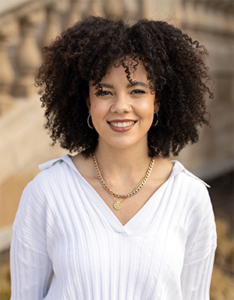 Kendall Riley is a doctoral candidate in the Department of Sociology and Criminology at the University of Iowa. Her research focuses on how the social environment influences physical health and perpetuates racial disparities in health. Her dissertation explores how the carceral state contributes to health inequalities among women. Specifically, she considers how states vary in their application of carceral logics and how this spatially patterns disease distribution and disparities in aging among Black and White women. Kendall has experience with using both qualitative and quantitative methodologies in her research. Most of her work employs blood-based biomarkers as indicators of health and uses large-scale secondary data, regression techniques, multi-level modeling, structural equation modeling, and factor analyses. Some of her research has been published in Social Science and Medicine, Journal of Health and Aging, and the Journal of Crime and Justice. In addition to being recognized as a Ruth D. Peterson fellow, Kendall is also a National Science Foundation Graduate Research Fellow. She is also an alum of Indiana University where she received B.S. degrees in Human Biology and Psychology. Beyond her research, Kendall enjoys mentoring students from underrepresented backgrounds in academia through Indiana University’s Center of Excellence for Women & Technology’s Black women & STEM Program and University of Iowa’s Peer-to-Peer mentoring program.
Kendall Riley is a doctoral candidate in the Department of Sociology and Criminology at the University of Iowa. Her research focuses on how the social environment influences physical health and perpetuates racial disparities in health. Her dissertation explores how the carceral state contributes to health inequalities among women. Specifically, she considers how states vary in their application of carceral logics and how this spatially patterns disease distribution and disparities in aging among Black and White women. Kendall has experience with using both qualitative and quantitative methodologies in her research. Most of her work employs blood-based biomarkers as indicators of health and uses large-scale secondary data, regression techniques, multi-level modeling, structural equation modeling, and factor analyses. Some of her research has been published in Social Science and Medicine, Journal of Health and Aging, and the Journal of Crime and Justice. In addition to being recognized as a Ruth D. Peterson fellow, Kendall is also a National Science Foundation Graduate Research Fellow. She is also an alum of Indiana University where she received B.S. degrees in Human Biology and Psychology. Beyond her research, Kendall enjoys mentoring students from underrepresented backgrounds in academia through Indiana University’s Center of Excellence for Women & Technology’s Black women & STEM Program and University of Iowa’s Peer-to-Peer mentoring program.
_____________________ *** _____________________

Kaelyn Sanders is a Ph.D. Candidate (ABD) in the School of Criminal Justice at Michigan State University. Using critical and intersectional frameworks, Kaelyn’s research sits at the nexus of community supervision, reintegration, and inequality. Her research has been published in the Journal of Criminal Justice, Feminist Criminology, a
nd the Kansas Journal of Law & Public Policy. Kaelyn’s dissertation research will qualitatively explore the intersections of racial, gender, carceral, and digital inequality among Black men and women on parole in Wayne and Genesee County, Michigan.
As a Ph.D. Candidate, Kaelyn has worked on program evaluation projects for community-based reentry and gun violence programs in the state of Michigan and serves as the graduate assistant for her program’s Prospective Doctoral Student Recruitment and Retention Program Grant. In this role, she works to increase DEI in her graduate program by meeting with students at minority-serving institutions and assessing areas where current graduate students can be better supported. She previously held a summer graduate research associate position at Arnold Ventures working on their pretrial justice team and interned at a local probation and reentry program in Lansing, Michigan.
Kaelyn is also a 2024 National Academies of Sciences, Engineering, and Medicine Mirzayan Science and Technology Policy Fellow, a National Science Foundation Graduate Research Fellow, and an alumni of The Ohio State University, where she received her B.A. in Sociology and Criminology.
_____________________ *** _____________________
_____________________ *** _____________________
THORSTON SELLIN & SHELDON AND ELEANOR GLUECK AWARD RECIPIENTS
The Thorsten Sellin & Sheldon and Eleanor Glueck Award is given in order to call attention to criminological scholarship that considers problems of crime and justice as they are manifested outside the United States; internationally or comparatively.
1974: Franco Ferracuti
1975: Nigel Walker
1976: Leon Radzinowicz
1977: Sholmo Shoham
1978: Nils Christie
1979: Johannes Andenaes
1980: Hans H. Jescheck
1981: Willem H. Nagel
1982: Frederick McClintock
1983: Inkeri Anttila
1984: David P. Farrington
1985: Stanley Cohen
1986: Roger Hood
1987: Marc Ancel
1988: Maureen Caints
1989: Josine Junger-Tas
1990: Gordon Trasler
1991: Gordon Hawkins
1992: John B. Braithwaite
1993: David Garland
1994: Per-Olof Wikstrom
1995: Ulla Bondeson
1996: Anthony Bottoms
1997: Pat Carlen
1998: Jock Young
1999: Hans-Jurgen Kerner
2000: Pat O’Malley
2001: Martin Killias
2002: Friedrich Loesel
2003: Jonathan Shepherd
2004: Frances Heidensohn
2005: Richard Tremblay
2006: Peter Grabosky
2007: Susanne Karstedt
2008: Jan van Dijk
2009: David Nelken
2010: Ross Homel
2011: Manuel Eisner
2012: Marc Le Blanc
2013: Clifford Shearing
2014: Michael Levi
2015: Tapio Lappi-Seppälä
2016: Letizia Paoli
2017: Gerben Bruinsma
2018: Lorraine Mazerolle
2019: Paul Nieuwbeerta
2020: Rob White
 Julian V. Roberts holds a Ph.d. from the University of Toronto and an LL.M. from the University of London. He is currently a Professor of Criminology in the Faculty of Law, University of Oxford. Prior to that he taught at the University of Toronto and Ottawa. He was a member of the Sentencing Council of England and Wales and an advisor to the American Law Institute Model Penal Code Sentencing project. His latest book (Paying for the Past, with Richard Frase) was published by Oxford University Press in 2019. He has served as Editor of the Canadian Journal of Criminology (1992-2003) and the European Journal of Criminology (2005-2012). Julian has been a Visiting Professor at the following universities: Minnesota; Leuven; Haifa; Kings College London; Cambridge; Toronto; Ottawa; Ferrara; and Brussels. Books and edited volumes include: Sentencing in Canada (2020, with D. Cole); Core Issues in Criminal Law and Criminal Justice (2019, with K. Ambos et al.); Criminal Justice: A Short Introduction (2015); Popular Punishment (2014, with J. Ryberg); Sentencing Guidelines: The English Experience (2013, with A. Ashworth), Sentencing for Murder (2012, with B. Mitchell); Mitigation and Aggravation at Sentencing (2011); Previous Convictions at Sentencing (2010, with A. von Hirsch) Punishing Persistent Offenders (2008); Victims and Adversarial Criminal Justice, (2009, with A. Bottoms); Understanding Public Attitudes to Criminal Justice (2005, with M. Hough) Public Opinion, Crime, and Criminal Justice (1997, with L. Stalans); Evaluating Justice (1993, with J. Hudson).
Julian V. Roberts holds a Ph.d. from the University of Toronto and an LL.M. from the University of London. He is currently a Professor of Criminology in the Faculty of Law, University of Oxford. Prior to that he taught at the University of Toronto and Ottawa. He was a member of the Sentencing Council of England and Wales and an advisor to the American Law Institute Model Penal Code Sentencing project. His latest book (Paying for the Past, with Richard Frase) was published by Oxford University Press in 2019. He has served as Editor of the Canadian Journal of Criminology (1992-2003) and the European Journal of Criminology (2005-2012). Julian has been a Visiting Professor at the following universities: Minnesota; Leuven; Haifa; Kings College London; Cambridge; Toronto; Ottawa; Ferrara; and Brussels. Books and edited volumes include: Sentencing in Canada (2020, with D. Cole); Core Issues in Criminal Law and Criminal Justice (2019, with K. Ambos et al.); Criminal Justice: A Short Introduction (2015); Popular Punishment (2014, with J. Ryberg); Sentencing Guidelines: The English Experience (2013, with A. Ashworth), Sentencing for Murder (2012, with B. Mitchell); Mitigation and Aggravation at Sentencing (2011); Previous Convictions at Sentencing (2010, with A. von Hirsch) Punishing Persistent Offenders (2008); Victims and Adversarial Criminal Justice, (2009, with A. Bottoms); Understanding Public Attitudes to Criminal Justice (2005, with M. Hough) Public Opinion, Crime, and Criminal Justice (1997, with L. Stalans); Evaluating Justice (1993, with J. Hudson).
_________________________________________________________________________
_________________________________________________________________________
 Katja Franko is Professor of Criminology at the University of Oslo, Norway. She studied law at the University of Ljubljana, Slovenia, and obtained in 2003 her PhD degree from the University of Oslo, where she was appointed regular professor in 2009. She is member of the Norwegian Academy of Science and Letters. Katja has published extensively on globalisation, migration and border control, international police co-operation and the use of advanced information and communication technologies in crime control strategies. Her recent publications include Victimhood, Memory, and Consumerism: Profiting from Pablo (Oxford University Press, 2023, with David R. Goyes), Globalization and Crime (3rd edition, 2020, Sage) and The Crimmigrant Other: Migration and Penal Power (2020, Routledge).
Katja Franko is Professor of Criminology at the University of Oslo, Norway. She studied law at the University of Ljubljana, Slovenia, and obtained in 2003 her PhD degree from the University of Oslo, where she was appointed regular professor in 2009. She is member of the Norwegian Academy of Science and Letters. Katja has published extensively on globalisation, migration and border control, international police co-operation and the use of advanced information and communication technologies in crime control strategies. Her recent publications include Victimhood, Memory, and Consumerism: Profiting from Pablo (Oxford University Press, 2023, with David R. Goyes), Globalization and Crime (3rd edition, 2020, Sage) and The Crimmigrant Other: Migration and Penal Power (2020, Routledge).
She is co-founder and co-editor of Routledge Studies in Criminal Justice, Borders and Citizenship. Her book Sentencing in the Age of Information: From Faust to Macintosh was a 2006 joint winner of the Socio-Legal Studies Association Hart Book Prize. She was also awarded a European Research Council grant for a project on the intersections of migration control and penal power, entitled Crime Control in the Borderlands of Europe, and is currently heading a research project about digitalization and private economies of knowledge in criminal justice (CRIMKNOW).
_________________________________________________________________________
 Federico Varese is Professor of Sociology at SciencesPo, Paris and Senior Research Fellow, Nuffield College, Oxford. Previously, he was Professor of Criminology (2004-2023) and Head of the Department of Sociology at Oxford University (2021-2023). He also taught at Yale University and has been Visiting Professor at the Universities of Milan and Hong Kong. His research interests include organised crime, corruption, Soviet criminal history, social network analysis and analytical social theory. He is the author of four monographs – The Russian Mafia (OUP, 2001), Mafias on the Move (Princeton UP, 2011), Mafia Life (OUP, 2018) and Russia in Four Criminals (Polity, 2024), and an edited collection, Organized Crime (2010). Mafia life (2018) has been translated into eight languages. Mafias on the Move was the Recipient of The International Association for the Study of Organized Crime 2012 Outstanding Publication Award. The Russian Mafia was The Co-Recipient of the Hewitt Book Prize awarded by The American Association for the Advancement of Slavic Studies, 2002.
Federico Varese is Professor of Sociology at SciencesPo, Paris and Senior Research Fellow, Nuffield College, Oxford. Previously, he was Professor of Criminology (2004-2023) and Head of the Department of Sociology at Oxford University (2021-2023). He also taught at Yale University and has been Visiting Professor at the Universities of Milan and Hong Kong. His research interests include organised crime, corruption, Soviet criminal history, social network analysis and analytical social theory. He is the author of four monographs – The Russian Mafia (OUP, 2001), Mafias on the Move (Princeton UP, 2011), Mafia Life (OUP, 2018) and Russia in Four Criminals (Polity, 2024), and an edited collection, Organized Crime (2010). Mafia life (2018) has been translated into eight languages. Mafias on the Move was the Recipient of The International Association for the Study of Organized Crime 2012 Outstanding Publication Award. The Russian Mafia was The Co-Recipient of the Hewitt Book Prize awarded by The American Association for the Advancement of Slavic Studies, 2002.
Varese has published extensively in academic journals, such as Social Networks, The British Journal of Criminology, Law and Society Review, Archives Européenes de Sociologie, Political Studies, Cahiers du Monde Russe, Rationality & Society, European Sociological Review, and Trends in Organized Crime, among others. He has served as editor of Global Crime (2006-2011) and has offered testimonies to parliamentary commissions in Canada, Italy, and the UK. In 2021, he was awarded an advanced grant from the European Research Council for a project on the governance dimension of organized crime.
_________________________________________________________________________
EDWIN H. SUTHERLAND AWARD RECIPIENTS
1960: Thorsten Sellin
1961: Orlando W. Wilson
1962: Negley Teeters
1963: Herbert Wechsler, Walter Reckless
1964: Hon. James Chalmers McRuer
1965: no award given
1966: George Vold
1967: Donald R. Cressey
1968: Denis Szabo
1969: Lloyd E. Ohlin
1970: Alfred Lindesmith
1971: Marshall Clinard
1972: Leslie Wilkins
1973: Edwin Lemert
1974: Simon Dinitz
1975: C. Ray Jeffery
1976: Daniel Glaser
1977: Solomon Kobrin
1978: Seymour Halleck
1979: James Short, Jr.
1980: Gresham Sykes
1981: Albert J. Reiss, Jr.
1982: Gwynne Nettler
1983: Jack P. Gibbs
1984: Richard Quinney
1985: Gilbert Geis
1986: Travis Hirschi
1987: Alfred Blumstein
1988: Ronald L. Akers
1989: Marvin E. Wolfgang
1990: Malcolm W. Klein
1991: LaMar Empey
1992: Lee Robins
1993: Albert K. Cohen
1994: Joan McCord
1995: Delbert S. Elliott
1996: Robert K. Merton
1997: John Hagan
1998: Charles R. Tittle
1999: Lawrence Sherman
2000: Norval Morris
2001: Robert J. Sampson
2002: David P. Farrington
2003: William Chambliss
2004: John Braithwaite
2005: John H. Laub
2006: Daniel S. Nagin
2007: Franklin Zimring
2008: Terence P. Thornberry
2009: Nicole Rafter
2010: Francis Cullen
2011: Ruth D. Peterson
2012: David Garland
2013: Cathy Spatz Widom
2014: David Weisburd
2015: Robert Agnew
2016: Ross L. Matsueda
2017: Rick Rosenfeld
2018: Sally S. Simpson
2019: Peggy Giordano
2020: Gary LaFree
 Steven F. Messner received his B. A. from Columbia University and his M.A. and Ph.D. in Sociology from Princeton University. He is Distinguished Teaching Professor of Sociology Emeritus at the University at Albany, State University of New York. He has also taught at Columbia University and Nankai University (China), and he has been a research fellow at the Institute for Interdisciplinary Research on Conflict and Violence, University of Bielefeld (Germany). His research focuses on social institutions and crime, understanding spatial and temporal patterns of crime, and crime and social control in China. In addition to his publications in professional journals, he is co-author of Crime and the American Dream, Crime and the Economy, Perspectives on Crime and Deviance, Criminology: An Introduction Using ExplorIt, and co-editor of Theoretical Integration in the Study of Deviance and Crime, Crime and Social Control in a Changing China, The Emergence of a New Urban China: Insiders’ Perspectives, and The SAGE Handbook of Criminological Research Methods. He has been selected as a University at Albany Collins Fellow and has received the following awards from the University or the State University of New York: the Chancellor’s Award for Excellence in Scholarship and Creative Activities, the Research and Scholarship Award from the Research Foundation, and the University at Albany Awards for Excellence in Research, for Excellence in Teaching, and for Excellence in Academic Service. He is a Fellow and past President of the American Society of Criminology.
Steven F. Messner received his B. A. from Columbia University and his M.A. and Ph.D. in Sociology from Princeton University. He is Distinguished Teaching Professor of Sociology Emeritus at the University at Albany, State University of New York. He has also taught at Columbia University and Nankai University (China), and he has been a research fellow at the Institute for Interdisciplinary Research on Conflict and Violence, University of Bielefeld (Germany). His research focuses on social institutions and crime, understanding spatial and temporal patterns of crime, and crime and social control in China. In addition to his publications in professional journals, he is co-author of Crime and the American Dream, Crime and the Economy, Perspectives on Crime and Deviance, Criminology: An Introduction Using ExplorIt, and co-editor of Theoretical Integration in the Study of Deviance and Crime, Crime and Social Control in a Changing China, The Emergence of a New Urban China: Insiders’ Perspectives, and The SAGE Handbook of Criminological Research Methods. He has been selected as a University at Albany Collins Fellow and has received the following awards from the University or the State University of New York: the Chancellor’s Award for Excellence in Scholarship and Creative Activities, the Research and Scholarship Award from the Research Foundation, and the University at Albany Awards for Excellence in Research, for Excellence in Teaching, and for Excellence in Academic Service. He is a Fellow and past President of the American Society of Criminology.
_________________________________________________________________________
 D. Wayne Osgood received his A.B. in Psychology from the University of California at Los Angeles and his M.A. and Ph.D. in Psychology from the University of Colorado, Boulder. He is Professor Emeritus of Criminology and Sociology at Pennsylvania State University, University Park, which he joined in 1996. From 1986-1996, he was a faculty member in the Department of Sociology at the University of Nebraska—Lincoln. Earlier, he held research positions at the Behavioral Research Institute of Boulder, CO, the University of Michigan’s Institute for Social Research, and Boys Town. He was a member of the MacArthur Research Network on Transitions to Adulthood and the National Consortium on Violence Research. From Pennsylvania State University, he received the Faculty Scholar Medal in the Social and Behavioral Sciences, the Howard B. Palmer Faculty Mentoring Award, and the College of Liberal Arts Award for Distinction in the Social Sciences. He is a Fellow of the American Society of Criminology, and he has served the society as Council Member, Vice President, and Lead Editor of the society’s flagship journal, Criminology, for 2012-2017.
D. Wayne Osgood received his A.B. in Psychology from the University of California at Los Angeles and his M.A. and Ph.D. in Psychology from the University of Colorado, Boulder. He is Professor Emeritus of Criminology and Sociology at Pennsylvania State University, University Park, which he joined in 1996. From 1986-1996, he was a faculty member in the Department of Sociology at the University of Nebraska—Lincoln. Earlier, he held research positions at the Behavioral Research Institute of Boulder, CO, the University of Michigan’s Institute for Social Research, and Boys Town. He was a member of the MacArthur Research Network on Transitions to Adulthood and the National Consortium on Violence Research. From Pennsylvania State University, he received the Faculty Scholar Medal in the Social and Behavioral Sciences, the Howard B. Palmer Faculty Mentoring Award, and the College of Liberal Arts Award for Distinction in the Social Sciences. He is a Fellow of the American Society of Criminology, and he has served the society as Council Member, Vice President, and Lead Editor of the society’s flagship journal, Criminology, for 2012-2017.
Prof. Osgood’s research has focused on peers and delinquency, time use and offending, crime and the life course, evaluating programs to prevent and reduce delinquency, and quantitative research methods. He is especially proud of his twenty-one Ph.D. students and their many and varied accomplishments. Seven of them won first or second place in ASC’s Gene Carte Graduate Student Paper Competition, and two won the Penn State-wide Alumni Dissertation Award.
_________________________________________________________________________
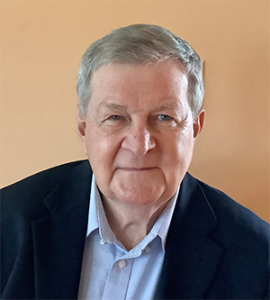 Darrell Steffensmeier is Professor of Sociology and Criminology at Pennsylvania State University. A Fellow of American Society of Criminology (ASC), he has authored articles on a range of criminology/criminal justice topics. His book, The Fence: In the Shadow of Two Worlds, received the 1987 Outstanding Scholarship Award of Society for Study of Social Problems. Another book, Confessions of a Dying Thief: Understanding Criminal Careers and Illegal Enterprise, received the 2006 Outstanding Scholarship Award of American Society of Criminology (ASC). Two articles have received recent awards from ASC for outstanding scholarship—2011 Criminology article involving a conceptual and empirical assessment of the racial invariance thesis, and 2017 Criminology article comparing the age-crime relation in cross-national context (Taiwan vs U.S). Longstanding interests concern how stratification–gender, age, race-ethnicity, place—and culture influence criminal involvement and social responses to it. Favorite research topics include corporate crime, organized-transnational crime, theft-burglary-fencing networks, and the gender/crime relationship. Major current projects involve developing the “gendered paradigm” of female offending, elaborating a relational-network theory of “crime opportunity” as sketched in The Fence, Confessions of a Dying Thief, and earlier writings; updating the ‘focal concerns’ theory of criminal justice/punishment decision making; and studying variability in the age-crime relation in cross-national and historical-contemporary context. Very thankful for great family support and the opportunity to work with good colleagues, teach many-many undergraduates and ‘mentor’ numerous graduate students who have gone on to make their marks as good citizens and teachers-scholars-policymakers in our field.
Darrell Steffensmeier is Professor of Sociology and Criminology at Pennsylvania State University. A Fellow of American Society of Criminology (ASC), he has authored articles on a range of criminology/criminal justice topics. His book, The Fence: In the Shadow of Two Worlds, received the 1987 Outstanding Scholarship Award of Society for Study of Social Problems. Another book, Confessions of a Dying Thief: Understanding Criminal Careers and Illegal Enterprise, received the 2006 Outstanding Scholarship Award of American Society of Criminology (ASC). Two articles have received recent awards from ASC for outstanding scholarship—2011 Criminology article involving a conceptual and empirical assessment of the racial invariance thesis, and 2017 Criminology article comparing the age-crime relation in cross-national context (Taiwan vs U.S). Longstanding interests concern how stratification–gender, age, race-ethnicity, place—and culture influence criminal involvement and social responses to it. Favorite research topics include corporate crime, organized-transnational crime, theft-burglary-fencing networks, and the gender/crime relationship. Major current projects involve developing the “gendered paradigm” of female offending, elaborating a relational-network theory of “crime opportunity” as sketched in The Fence, Confessions of a Dying Thief, and earlier writings; updating the ‘focal concerns’ theory of criminal justice/punishment decision making; and studying variability in the age-crime relation in cross-national and historical-contemporary context. Very thankful for great family support and the opportunity to work with good colleagues, teach many-many undergraduates and ‘mentor’ numerous graduate students who have gone on to make their marks as good citizens and teachers-scholars-policymakers in our field.
_________________________________________________________________________
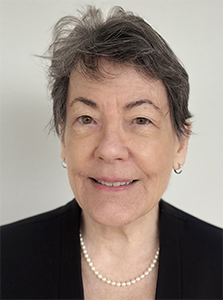 Kathleen Daly is Professor of Criminology and Criminal Justice at Griffith University in Brisbane. She began her career in the US as assistant and then associate professor at State University of New York-Albany (1982-83), Yale University (1983-92), and University of Michigan (1992-95). In 1995, she travelled to Australia as a Senior Fulbright Scholar. She has written on feminism and criminology, sex/gender, race, crime, and criminal justice; and on restorative, Indigenous, civil, and money justice. Her recent work analyzes responses to sexual violence, institutional abuse of children, and historical/policy wrongs. She is a Fellow of the Academy of the Social Sciences in Australia, American Society of Criminology (ASC), and Australian and New Zealand Society of Criminology (ANZSOC). She was President of ANZSOC (2005-09), awarded ANZSOC Distinguished Criminologist, and a member of the Australian Commonwealth Independent Advisory Council on Redress. She received ASC’s Hindelang book award (1995) for Gender, Crime, and Punishment and ANZSOC’s Alder book prize (2015) for Redressing Institutional Abuse of Children. To date, 25 of her publications have been reprinted and eight translated into Chinese, Dutch, French, Korean, Serbian, and Spanish.
Kathleen Daly is Professor of Criminology and Criminal Justice at Griffith University in Brisbane. She began her career in the US as assistant and then associate professor at State University of New York-Albany (1982-83), Yale University (1983-92), and University of Michigan (1992-95). In 1995, she travelled to Australia as a Senior Fulbright Scholar. She has written on feminism and criminology, sex/gender, race, crime, and criminal justice; and on restorative, Indigenous, civil, and money justice. Her recent work analyzes responses to sexual violence, institutional abuse of children, and historical/policy wrongs. She is a Fellow of the Academy of the Social Sciences in Australia, American Society of Criminology (ASC), and Australian and New Zealand Society of Criminology (ANZSOC). She was President of ANZSOC (2005-09), awarded ANZSOC Distinguished Criminologist, and a member of the Australian Commonwealth Independent Advisory Council on Redress. She received ASC’s Hindelang book award (1995) for Gender, Crime, and Punishment and ANZSOC’s Alder book prize (2015) for Redressing Institutional Abuse of Children. To date, 25 of her publications have been reprinted and eight translated into Chinese, Dutch, French, Korean, Serbian, and Spanish.
_________________________________________________________________________
TEACHING AWARD RECIPIENTS
The Teaching Award is a lifetime-achievement award designed to recognize excellence in undergraduate and/or graduate teaching over the span of an academic career.
2010: Mark Israel, University of Western Australia
2011: David McDowall, SUNY-Albany
2012: no award given
2013: Jody Clay-Warner, University of Georgia
2014: Laure Weber Brooks, University of Maryland
2015: no award given
2016: Lori Pompa, Temple University
2017: Michelle Inderbitzin, Oregon State University
2018: Danielle S. Rudes, George Mason University
2019: Valerie Jenness, University of California, Irvine
2020: Kevin Wright, Arizona State University
 Christina DeJong is an Associate Professor in the School of Criminal Justice at Michigan State University. Her scholarship is focused on the intersection of gender, sexuality, and race, particularly with regard to victimization and treatment by the criminal legal system. Over the course of her career, she has been committed to providing a meaningful educational experience for students at all levels of study. Her primary areas of teaching are in the areas of gender and crime (undergraduate), genocide and human rights (general education), research methods (masters), and advanced statistical analysis (doctoral). She has also taught courses for students in the Interdisciplinary Studies major, and mentored students in the Social Science Scholars program at MSU. As an instructor, she utilizes active and engaged learning rooted in critical, feminist, and queer pedagogies. These strategies place women and minoritized groups in the center of the discussion, and do not accept the status quo view of the criminal justice system. In her classes, students are encouraged to carefully analyze reliable sources of information and avoid making assumptions based on common myths and media portrayals of the criminal justice system. Critical pedagogies also reject traditional assessment methods, such as standardized tests. Assessments are rooted in critical thinking and evaluation rather than rote memorization. During the summer of 2020, Dr. DeJong created the Graduate Teaching Workshop for all graduate students scheduled to teach during the 2020-2021 academic year. In these meetings, the group not only discussed best practices for instruction, but strategized how best to manage online instruction during a global pandemic.
Christina DeJong is an Associate Professor in the School of Criminal Justice at Michigan State University. Her scholarship is focused on the intersection of gender, sexuality, and race, particularly with regard to victimization and treatment by the criminal legal system. Over the course of her career, she has been committed to providing a meaningful educational experience for students at all levels of study. Her primary areas of teaching are in the areas of gender and crime (undergraduate), genocide and human rights (general education), research methods (masters), and advanced statistical analysis (doctoral). She has also taught courses for students in the Interdisciplinary Studies major, and mentored students in the Social Science Scholars program at MSU. As an instructor, she utilizes active and engaged learning rooted in critical, feminist, and queer pedagogies. These strategies place women and minoritized groups in the center of the discussion, and do not accept the status quo view of the criminal justice system. In her classes, students are encouraged to carefully analyze reliable sources of information and avoid making assumptions based on common myths and media portrayals of the criminal justice system. Critical pedagogies also reject traditional assessment methods, such as standardized tests. Assessments are rooted in critical thinking and evaluation rather than rote memorization. During the summer of 2020, Dr. DeJong created the Graduate Teaching Workshop for all graduate students scheduled to teach during the 2020-2021 academic year. In these meetings, the group not only discussed best practices for instruction, but strategized how best to manage online instruction during a global pandemic.
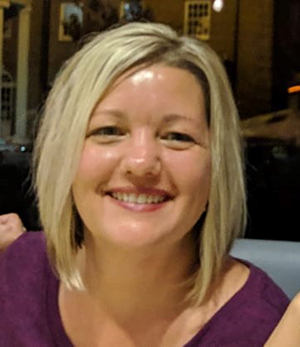 Emily Lenning is a Professor of Criminal Justice at Fayetteville State University. As an educator, she is committed to engaging in critical pedagogy that is bolstered by feminist and queer perspectives. She is flexible to meet the needs of diverse learners, and challenges herself and her students to look beyond the classroom for opportunities to engage in lifelong learning. To meet these goals, she has embraced Universal Design for Learning (UDL) and backwards course design, and incorporates high impact practices, such as study abroad and creative projects, into her courses. Additionally, she has served students with learning differences as the Director of Faculty Development for the Bronco STAR program, served as co-teacher of the FSU Faculty Development Seminar, and co-founded the FSU Safezone Center, making it the third historically Black college or university (HBCU) in the country to open an office to serve its LGBTQ students. Her dedication to teaching has been recognized by several awards, including the 2017-2018 UNC Board of Governors Award for Excellence in Teaching. Her scholarship includes articles, books, book chapters, presentations, and invited lectures on a variety of topics, including creative pedagogy, state violence against women, and the experiences of Queer people involved in the criminal legal system. Her most recognized contribution to the field is her co-authored book Queer Criminology, which won the 2016 Book Award from the ASC Division on Critical Criminology and Social Justice. A second edition of the book, which has been adopted in classrooms on three continents, was recently released.
Emily Lenning is a Professor of Criminal Justice at Fayetteville State University. As an educator, she is committed to engaging in critical pedagogy that is bolstered by feminist and queer perspectives. She is flexible to meet the needs of diverse learners, and challenges herself and her students to look beyond the classroom for opportunities to engage in lifelong learning. To meet these goals, she has embraced Universal Design for Learning (UDL) and backwards course design, and incorporates high impact practices, such as study abroad and creative projects, into her courses. Additionally, she has served students with learning differences as the Director of Faculty Development for the Bronco STAR program, served as co-teacher of the FSU Faculty Development Seminar, and co-founded the FSU Safezone Center, making it the third historically Black college or university (HBCU) in the country to open an office to serve its LGBTQ students. Her dedication to teaching has been recognized by several awards, including the 2017-2018 UNC Board of Governors Award for Excellence in Teaching. Her scholarship includes articles, books, book chapters, presentations, and invited lectures on a variety of topics, including creative pedagogy, state violence against women, and the experiences of Queer people involved in the criminal legal system. Her most recognized contribution to the field is her co-authored book Queer Criminology, which won the 2016 Book Award from the ASC Division on Critical Criminology and Social Justice. A second edition of the book, which has been adopted in classrooms on three continents, was recently released.
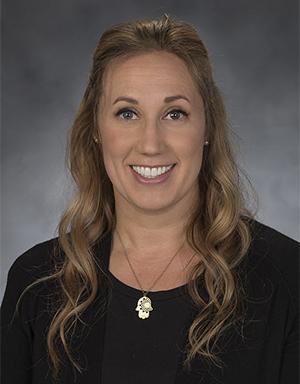 Nicole Fox, PhD is an Associate Professor of Criminal Justice at California State University Sacramento in the Division of Criminal Justice. She teaches about global criminology, human rights, gender, law, and criminological theory. In 2019 she created, developed, and led the first study abroad course ever in her department to Ghana, and has taken students there every summer since. While in Ghana, students learn about comparative criminal justice, visiting correctional facilities, observing court cases, reflecting on the slave dungeons as the birthplace of mass incarceration, and even having the chance to visit the supreme court justice herself. Dr. Fox spends her free time leading several book clubs she created in Folsom, Sacramento, and Solano prisons, whom her students at CSUS now participate in as interns. Her research centers on how racial and ethnic contention impacts communities, with a focus on how remembrances of adversity shape social change and collective memory. Her 2021 book After Genocide: Memory and Reconciliation in Rwanda (University of Wisconsin Press) focuses on how memorials to past atrocity impacts community development and reconciliation for survivors of genocide and genocidal rape. Her work has been generously supported by the Harry Frank Guggenheim Foundation, the National Science Foundation, Andrew Mellon Foundation, among others. She also serves on the United Nations Economic and Social Council and contributes to the UN Commission for the Status of Women held annually at the UN headquarters.
Nicole Fox, PhD is an Associate Professor of Criminal Justice at California State University Sacramento in the Division of Criminal Justice. She teaches about global criminology, human rights, gender, law, and criminological theory. In 2019 she created, developed, and led the first study abroad course ever in her department to Ghana, and has taken students there every summer since. While in Ghana, students learn about comparative criminal justice, visiting correctional facilities, observing court cases, reflecting on the slave dungeons as the birthplace of mass incarceration, and even having the chance to visit the supreme court justice herself. Dr. Fox spends her free time leading several book clubs she created in Folsom, Sacramento, and Solano prisons, whom her students at CSUS now participate in as interns. Her research centers on how racial and ethnic contention impacts communities, with a focus on how remembrances of adversity shape social change and collective memory. Her 2021 book After Genocide: Memory and Reconciliation in Rwanda (University of Wisconsin Press) focuses on how memorials to past atrocity impacts community development and reconciliation for survivors of genocide and genocidal rape. Her work has been generously supported by the Harry Frank Guggenheim Foundation, the National Science Foundation, Andrew Mellon Foundation, among others. She also serves on the United Nations Economic and Social Council and contributes to the UN Commission for the Status of Women held annually at the UN headquarters.
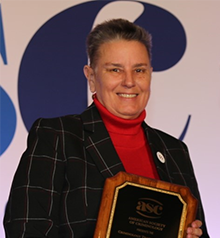
AUGUST VOLLMER AWARD RECIPIENTS
The August Vollmer Award recognizes an individual whose scholarship or professional activities have made outstanding contributions to justice and/or to the treatment or prevention of criminal or delinquent behavior.
1960: Paul Bohannon, Marvin E. Wolfgang
1961: Sheldon/Eleanor Glueck
1962: James Bennett
1963: Austin MacCormick
1964: Mr. J. Adrien Robert
1965: no award given
1966: Judge George Edwards
1967: Howard Leary
1968: Myrl Alexander
1969: Hon. Joseph Tydings
1970: Milton Rector
1971: no award given
1972: Jerome Skolnick
1973: E. Preston Sharpe
1974: Patrick V. Murphy, Sol Rubin
1975: Herbert Sturz
1976: Patricia Wald
1977: Richard A. McGee
1978: Judge David Bazelon
1979: Norval Morris
1980: Gerhard O.W. Mueller
1981: Vincent O’Leary
1982: Don M. Gottfredson
1983: no award given
1984: Benjamin Ward
1985: John Keith Irwin
1986: Anthony G. Amsterdam
1987: Jerome G. Miller
1988: Lee Brown
1989: Allen Breed
1990: Daniel Glaser
1991: Caleb Foote
1992: James K. Stewart
1993: Barry Krisberg
1994: Joan Petersilia
1995: Russell & Rebecca Dobash
1996: Elizabeth Stanko
1997: Hugo Adam Bedau
1998: Peter W. Greenwood
1999: J. David Hawkins
2000: William J. Bowers
2001: Hans Toch, Jeremy Travis
2002: James J. Fyfe
2003: Delbert S. Elliott
2004: Edward Latessa
2005: Jacquelyn C. Campbell
2006: Franklin Zimring
2007: Richard Catalano
2008: Malcolm W. Klein
2009: Elliott Currie
2010: Howard Snyder
2011: Patricia Van Voorhis
2012: John Goldkamp
2013: Mark Lipsey
2014: David Farrington
2015: C. Ronald Huff
2016: Denise Gottfredson
2017: David Weisburd
2018: Charles F. Wellford
2019: Valerie Jenness
2020: Larry Sherman; Presentation
 Anthony A. Braga is the Jerry Lee Professor of Criminology and the Director of the Crime and Justice Policy Lab in the Department of Criminology at the University of Pennsylvania. He collaborates with criminal justice, social service, and community-based organizations to produce high impact scholarship, randomized field experiments, and policy advice on the prevention of crime at problem places, the control of gang violence, and reductions in access to firearms by criminals. Braga has served as principal investigator or co-principal investigator on projects totaling more than $22 million in external funding from a variety of federal, state, and private grant-making institutions including the U.S. National Institute of Justice, National Institutes of Health, National Science Foundation, and Arnold Ventures. Braga is a fellow of the American Society of Criminology.
Anthony A. Braga is the Jerry Lee Professor of Criminology and the Director of the Crime and Justice Policy Lab in the Department of Criminology at the University of Pennsylvania. He collaborates with criminal justice, social service, and community-based organizations to produce high impact scholarship, randomized field experiments, and policy advice on the prevention of crime at problem places, the control of gang violence, and reductions in access to firearms by criminals. Braga has served as principal investigator or co-principal investigator on projects totaling more than $22 million in external funding from a variety of federal, state, and private grant-making institutions including the U.S. National Institute of Justice, National Institutes of Health, National Science Foundation, and Arnold Ventures. Braga is a fellow of the American Society of Criminology.
The practical value of his work in violence reduction in disadvantaged neighborhoods has been recognized by numerous awards, including the Civic Leadership Award (2004) presented by The Boston Foundation, the United States Attorney General’s Award for Outstanding Contributions to Community Partnerships for Public Safety (2009), and the U.S. Department of Justice Project Safe Neighborhoods Research Partner of the Year Award (2010). Between 2007 and 2013, Braga served as Chief Policy Advisor to former Boston Police Commissioner Edward F. Davis and worked with his command staff and line-level officers on award-winning community policing and crime prevention initiatives. Braga holds an M.P.A. from Harvard University, and a Ph.D. in criminal justice from Rutgers University.
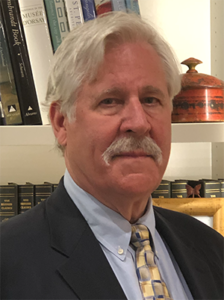 Scott H. Decker, PhD, is Chief Scientist and Senior Fellow in the Center for Justice Research and Innovation at CNA. He is Professor Emeritus in the School of Criminology and Criminal Justice at Arizona State University.
Scott H. Decker, PhD, is Chief Scientist and Senior Fellow in the Center for Justice Research and Innovation at CNA. He is Professor Emeritus in the School of Criminology and Criminal Justice at Arizona State University.
Decker’s translational work began in 1971 when he spent four weeks living “inside the walls” of the Indiana Boy’s School.
He has served on more than a dozen Boards or Commissions in St. Louis including Mental Health Board, Mayor’s Crime Commission, and the Juvenile Court Disproportionate Minority Confinement Task Force. He was a member of Arizona POST, the BJA Criminal Justice Futures group and the Missouri Sentencing Commission. He has a thirty-year relationship with the St. Louis Police department and for that service received the Chiefs Award in 2005.
Decker has made more than 100 presentations to agency and citizen groups, including the Keynote Address to the 2010 While House Conference. He was also the Keynote Speaker at the National Boys and Girls Clubs of America meeting (ironically pinch hitting for Cal Ripken on one of those occasions).
He has led or directed more than a dozen collaborative research projects involving community, social service and criminal justice groups. These projects include the St. Louis Homicide Project, Weed and Seed, Safe Futures, the Missouri Traffic Stop analysis and the LoneStar Project.
He has consistently focused on both the quality and utility of data for changing criminal justice decisionmaking, policy and practice. Students were engaged in all phases of these partnerships, ensuring future collaborative work.
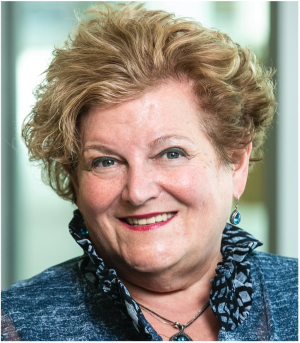 Faye S. Taxman, Ph.D., is a University Professor at the Schar School of Policy and Government at George Mason University. She is a health service criminologist. She is recognized for her work in the development of seamless systems-of-care models that link the criminal justice system with other health care and other service delivery systems and reengineering probation and parole supervision services. She has conducted experiments to examine different processes to improve treatment access and retention, to assess new models of probation supervision consistent with RNR frameworks, and to test new interventions. She developed the translational RNR Simulation Tool (www.gmuace.org/tools) to assist agencies to advance practice. Dr. Taxman has published more than 230 articles. She is the current Principal Investigator for the National Institute on Drug Abuse ‘s Justice Community Opioid Innovation Network (JCOIN) and the National Institute on Health’s HEAL Accelerator—both focus on her passion for translating science to practice. She is author of numerous books including Implementing Evidence-Based Community Corrections and Addiction Treatment (Springer, 2012 with Steven Belenko) and Handbook on Moving Corrections and Sentencing Forward: Building on the Record (with Pamela Lattimore and Beth Huebner, Routledge Press, 2020). She is co-Editor of Health & Justice. The American Society of Criminology’s Division of Sentencing and Corrections has recognized her as Distinguished Scholar twice as well as the Rita Warren and Ted Palmer Differential Intervention Treatment award. She received the Joan McCord Award in 2017 from the Division of Experimental Criminology. In 2018, she was appointed a Fellow of the American Society of Criminology. In 2019, she received the lifetime achievement award from the American Society of Criminology’s Division of Sentencing and Corrections. The Society for Implementation Research Collaboration (SIRC) in 2022 identified Dr. Taxman and her team for their work on collaborative and engaged research with the Mission Award. In 2023, she received an Award from the Schar School of Policy and Government for Outstanding Scholarship. She has a Ph.D. from Rutgers University’s School of Criminal Justice.
Faye S. Taxman, Ph.D., is a University Professor at the Schar School of Policy and Government at George Mason University. She is a health service criminologist. She is recognized for her work in the development of seamless systems-of-care models that link the criminal justice system with other health care and other service delivery systems and reengineering probation and parole supervision services. She has conducted experiments to examine different processes to improve treatment access and retention, to assess new models of probation supervision consistent with RNR frameworks, and to test new interventions. She developed the translational RNR Simulation Tool (www.gmuace.org/tools) to assist agencies to advance practice. Dr. Taxman has published more than 230 articles. She is the current Principal Investigator for the National Institute on Drug Abuse ‘s Justice Community Opioid Innovation Network (JCOIN) and the National Institute on Health’s HEAL Accelerator—both focus on her passion for translating science to practice. She is author of numerous books including Implementing Evidence-Based Community Corrections and Addiction Treatment (Springer, 2012 with Steven Belenko) and Handbook on Moving Corrections and Sentencing Forward: Building on the Record (with Pamela Lattimore and Beth Huebner, Routledge Press, 2020). She is co-Editor of Health & Justice. The American Society of Criminology’s Division of Sentencing and Corrections has recognized her as Distinguished Scholar twice as well as the Rita Warren and Ted Palmer Differential Intervention Treatment award. She received the Joan McCord Award in 2017 from the Division of Experimental Criminology. In 2018, she was appointed a Fellow of the American Society of Criminology. In 2019, she received the lifetime achievement award from the American Society of Criminology’s Division of Sentencing and Corrections. The Society for Implementation Research Collaboration (SIRC) in 2022 identified Dr. Taxman and her team for their work on collaborative and engaged research with the Mission Award. In 2023, she received an Award from the Schar School of Policy and Government for Outstanding Scholarship. She has a Ph.D. from Rutgers University’s School of Criminal Justice.
 Henry N. Pontell is a distinguished professor at John Jay College of Criminal Justice and the CUNY Graduate Center, and professor emeritus of criminology, law and society at the University of California, Irvine. His research and teaching interests include deviance and social control, white-collar and corporate crime, legal sanctioning, and comparative criminology, and his publications span the fields of criminology, sociology, criminal justice. law and society, psychology, economics, medicine, and public health. His most recent books are Financial Crime and Crises in the Era of False Profits (with Robert Tillman and William Black), and Wayward Dragon: White-Collar and Corporate Crime in China (with Adam Ghazi-Tehrani). He’s provided testimony on financial fraud before the U.S. Senate and to President Obama’s Financial Crisis Inquiry Commission, and worked with numerous law enforcement agencies including the FBI and U.S. Secret Service. Among other awards and honors Pontell received the Albert J. Reiss, Jr. Distinguished Scholarship Award from the American Sociological Association, the Donald R. Cressey Award from the Association of Certified Fraud Examiners, the Paul Tappan and Joseph T. Lohman Awards from the Western Society of Criminology, the Herbert Bloch and Gil Geis Lifetime Achievement Awards from the American Society of Criminology, and the Bruce Smith, Sr. Award from the Academy of Criminal Justice Sciences. He’s served as Vice-President of the American Society of Criminology, President of the Western Society of Criminology, and is a Fellow of both organizations. He currently edits the Oxford Research Encyclopedia of Criminology & Criminal Justice.
Henry N. Pontell is a distinguished professor at John Jay College of Criminal Justice and the CUNY Graduate Center, and professor emeritus of criminology, law and society at the University of California, Irvine. His research and teaching interests include deviance and social control, white-collar and corporate crime, legal sanctioning, and comparative criminology, and his publications span the fields of criminology, sociology, criminal justice. law and society, psychology, economics, medicine, and public health. His most recent books are Financial Crime and Crises in the Era of False Profits (with Robert Tillman and William Black), and Wayward Dragon: White-Collar and Corporate Crime in China (with Adam Ghazi-Tehrani). He’s provided testimony on financial fraud before the U.S. Senate and to President Obama’s Financial Crisis Inquiry Commission, and worked with numerous law enforcement agencies including the FBI and U.S. Secret Service. Among other awards and honors Pontell received the Albert J. Reiss, Jr. Distinguished Scholarship Award from the American Sociological Association, the Donald R. Cressey Award from the Association of Certified Fraud Examiners, the Paul Tappan and Joseph T. Lohman Awards from the Western Society of Criminology, the Herbert Bloch and Gil Geis Lifetime Achievement Awards from the American Society of Criminology, and the Bruce Smith, Sr. Award from the Academy of Criminal Justice Sciences. He’s served as Vice-President of the American Society of Criminology, President of the Western Society of Criminology, and is a Fellow of both organizations. He currently edits the Oxford Research Encyclopedia of Criminology & Criminal Justice.
 Daniel S. Nagin is Lester Hamburg University Professor of Public Policy and Statistics at the Heinz College, Carnegie Mellon University and Max Planck Law Fellow. He is an elected Fellow or Member of the American Society of Criminology, American Association for the Advancement of Science, American Academy of Political and Social Science, American Academy of Arts and Science, and (US) National Academy of Sciences. He is also recipient of the American Society of Criminology’s Edwin H Sutherland Award in 2006 and August Volmer Award in 2025, the Stockholm Prize in Criminology in 2014, Carnegie Mellon University’s Alumni Distinguished Achievement Award in 2016 and the National Academy of Science Award for Scientific Reviewing in 2017 and 2021 President of the American Society of Criminology. His research focuses on the evolution of criminal and antisocial behaviors over the life course, the deterrent effect of criminal and non-criminal penalties on illegal behaviors, and the development of statistical methods for analyzing longitudinal data. His work has appeared in such diverse outlets as the American Economic Review, American Sociological Review, Journal of the American Statistical Association, American Journal of Sociology, Archives of General Psychiatry, Criminology, Child Development, Demography, Psychological Methodology, Law & Society Review, Crime and Justice Annual Review, Operations Research, Proceeding of the National Academy of Sciences, and Stanford Law Review. He is also the author of Group-based Modeling of Development (Harvard University Press, 2005) and chaired and co-edited the report of the (US) National Academy of Science’s Committee on Deterrence and the Death Penalty.
Daniel S. Nagin is Lester Hamburg University Professor of Public Policy and Statistics at the Heinz College, Carnegie Mellon University and Max Planck Law Fellow. He is an elected Fellow or Member of the American Society of Criminology, American Association for the Advancement of Science, American Academy of Political and Social Science, American Academy of Arts and Science, and (US) National Academy of Sciences. He is also recipient of the American Society of Criminology’s Edwin H Sutherland Award in 2006 and August Volmer Award in 2025, the Stockholm Prize in Criminology in 2014, Carnegie Mellon University’s Alumni Distinguished Achievement Award in 2016 and the National Academy of Science Award for Scientific Reviewing in 2017 and 2021 President of the American Society of Criminology. His research focuses on the evolution of criminal and antisocial behaviors over the life course, the deterrent effect of criminal and non-criminal penalties on illegal behaviors, and the development of statistical methods for analyzing longitudinal data. His work has appeared in such diverse outlets as the American Economic Review, American Sociological Review, Journal of the American Statistical Association, American Journal of Sociology, Archives of General Psychiatry, Criminology, Child Development, Demography, Psychological Methodology, Law & Society Review, Crime and Justice Annual Review, Operations Research, Proceeding of the National Academy of Sciences, and Stanford Law Review. He is also the author of Group-based Modeling of Development (Harvard University Press, 2005) and chaired and co-edited the report of the (US) National Academy of Science’s Committee on Deterrence and the Death Penalty.
The President’s Award for Distinguished Contributions to Justice (established in 2001) is given annually to an individual or organization who, through either a single initiative or over a longer period of time, has made significant and distinguished contributions to the cause of justice. In the case of joint efforts, co-recipients may be named. The President submits a nominee for Board approval.
Members of the ASC Board may not receive this award during their term in office. The Executive Board may decide not to give the award in any given year.
PRESIDENT’S AWARD FOR DISTINGUISHED CONTRIBUTIONS TO JUSTICE RECIPIENTS
The first award given by the American Society of Criminology was to Robert H. Gault. He received an award of recognition from then ASC President Marcel Frym at the December 1959 ASC Annual Meetings which were held in Chicago. Dr. Gault served as the Editor-in-Chief of the Journal of Criminal Law and Criminology for 50 years
At the ASC Annual Meetings in Puerto Rico in November of 1971, then ASC President Simon Dinitz gave the following individuals, Presidential Citations:
Santos Amadeo
Helen Silver
Pedro Velez
A number of Presidential Citations were given by then ASC President Charles L. Newman at the ASC Annual Meetings in Caracas, Venezuela in November of 1972, but the names of the recipients have been lost to history
Please visit the individual Division websites for information about Division awards
Tax-free donations to ASC or any of the ASC Divisions.
© 2006-2023 American Society of Criminology
